Humax Digital Set Top Box Users Manual
Digital Set-Top Box to the manual 109ab154-7e37-4c11-bb20-c9f8e4b0d0ba
2015-01-21
: Humax Humax-Digital-Set-Top-Box-Users-Manual-351532 humax-digital-set-top-box-users-manual-351532 humax pdf
Open the PDF directly: View PDF ![]() .
.
Page Count: 57

Digital Set-Top Box with Irdeto embedded

Safety
Copyright & Glossary
Reference
STB Connections
Remote Control Unit
Function Guide
Main Menu Guide
Motorised System
Troubleshooting Guide
Menu Map
Specification
GB2
GB3
GB4 ~ GB5
GB6 ~ GB9
GB10 ~ GB11
GB12 ~ GB16
GB17 ~ GB45
GB46 ~ GB50
GB51
GB52 ~ GB53
GB54 ~ GB55
GB1
Contents

Safety
GB2
This STB has been manufactured to satisfy international safety standards.
Please read the following safety precautions carefully.
MAINS SUPPLY : 90 - 250 V AC 50/60 Hz
OVERLOADING : Do not overload a wall outlet, extension cord or adapter as this may result
in fire or electric shock.
LIQUIDS : The STB should not be exposed to dripping or splashing, and no objects
containing liquids, such as base, should be placed on the apparatus.
CLEANING : Disconnect the STB from the wall outlet before cleaning.
Use a light damp cloth (no solvents) to dust the STB.
VENTILATION : The slots on top of the STB must be left uncovered to allow proper airflow
to the unit.
Do not stand the STB on soft furnishings or carpets.
Do not expose the STB to direct sunlight, nor place it near a heater.
Do not stack electronic equipment on top of the STB.
ATTACHMENTS : Do not use any non-recommended attachments, as these maybe
hazardous or cause damage the STB.
CONNECTION TO THE SATELLITE DISH LNB
: Disconnect the STB from the mains before connecting or disconnecting the
cable from the satellite dish.
FAILURE TO DO SO CAN DAMAGE THE LNB.
CONNECTION TO THE TV
: Disconnect the STB from the mains before connecting or disconnecting the
cable from the satellite dish.
FAILURE TO DO SO CAN DAMAGE THE TV.
EARTHING : The LNB cable MUST BE EARTHED.
The earthing system must comply with SABS 061.
LOCATION : Place the STB indoors to avoid exposing it to lightning, rain or sun.

Copyright & Glossary
•
VIACCESSTM is a trademark of France Telecom.
•
CryptoWorks(TM) is a trademark of Philips Electronics N.V.
•
Irdeto is a trademark of Mindport BV.
•
Nagravision is a registered trademark of Kudelski S.A.
•
Conax is a trademark of Telenor Conax AS.
•
HUMAX cannot be held responsible for any problems caused by the use of unofficial
software. The use of software versions other than HUMAX official software will void the
manufacturer’s warranty. It is advised that only HUMAX formal software be used in all HUMAX
product ranges.
•
Antenna
A device that collects and radiates electromagnetic waves. This includes a satellite dish and
a broadband antenna.
•
Forward Error Correction (FEC)
An error control system for data transmission.
•
Frequency
The number of cycles or events per second, expressed in of Hertz(Hz) units.
•
Intermediate Frequency (IF)
A frequency to which a carrier frequency is shifted as an intermediate step in transmission or reception.
•
Low Noise Block (LNB) Downconverter
A low noise microwave amplifier and converter which downconverts a range of frequencies to the IF
range.
•
Packet Identifier (PID)
A set of numbers that identifies transport stream packets containing data from a single data stream.
•
Polarisation
Characteristic of an electromagnetic wave determined by the orientation of the electric field vector.
•
Quaternary Phase Shift Keying (QPSK)
Phase-shift keying in which four different phase angles are used.
•
Service
A channel into which a decoder or TV is tuned.
•
Transponder
An automatic device that receives, amplifies and retransmits a signal on a different frequency.
Copyright
Warning
Glossary
GB3

References
All our receivers are designed to be DiSEqC 1.0 compatible. This allows multiple antennae
to be connected to the STB simultaneously.
If you have two or more fixed antennae or LNBs, you can use a DiSEqC 1.0 switch.
1. Connect the coaxial cable from the first LNB to the LNB 1 or LNB A DiSEqC switch input
connector.
2. Connect the coaxial cable from the second LNB to the LNB 2 or LNB B DiSEqC switch in
put connector.
3. Do the same for the other LNBs.
4. Connect one end of a Coaxial cable to the RF DiSEqC switch output connector and the
other end to the LNB IN socket on the STB.
Please refer to page GB46.
You can connect either a single satellite antenna directly to the digital receiver or several
antennae via the converter box or multi-feed equipment LNB.
You can connect a further Sat-receiver (for example analogue) to the common antenna
equipment receiver that has satellite signals.
If you have another analogue or digital STB and you wish to use the same LNB, then you
can connect it via the loop via. Connect one end of a Coaxial cable to the LNB OUT
on the STB and connect the other end to the LNB IN on your second STB.
1. DiSEqC 1.0 Connection
2. DiSEqC 1.2 Connection
3. Connecting a Satellite antenna
4. Loop Via
GB4

The HUMAX digital set-top box is a highly sophisticated product-incorporating one of the
best software applications.
Whenever a problem is found with this software or extra functions or enhanced
applications are added, the software in the equipment must be upgraded.
In order to maintain correct product performance, it is essential to have the most
Up-to-date software. The latest news and releases on software versions may be found at
the HUMAX website - http://www.humaxdigital.com.
It is recommended that users register with HCSA (HUMAX Customer Service Area) and
periodically check the availability of software upgrade.
There are three methods for upgrading the software:
(a) set-top box to set-top box download (copies the software from the main unit into the slave
unit);
(b) PC to set-top box download (downloads the software directly from the PC to the model
requiring upgrading);
(c) OTA over-the-air (downloads the software, where the manufacturer reserves the right to
decide when and where to release via the satellite system).
Over The Air (OTA) is simply another alternative for downloading software versions.
However, the manufacturer reserves the right to decide when and where this software
upgrade takes place by "beaming" the latest software versions over the air via satellite
systems. Note that OTA is limited to certain geographical regions only, mainly due to
different satellites having different footprints (areas where the signal can be received).
SUSS (TM) is an official trademark and logo for HUMAX loader software to perform OTA.
The software upgrade via the satellite system can only occur under the following
circumstances:
1) the equipment should have appropriate loader software;
2) the manufacturer decides to release software downloading via a designated satellite
system;
3) the equipment must be properly "tuned" to the same satellite as the one used by the
manufacturer.
5. Software Upgradeing
GB5

STB Connections
STANDBY
Press to switch between Operation and Standby modes.
TV/RADIO
Press to switch between TV and Radio modes.
P-
Use to change services down.
P+
Use to change services up.
STANDBY LED (RED)
Indicates that the STB is under standby.
TV LED (GREEN)
The LED light goes on when in TV mode.
RADIO LED (YELLOW)
The LED light goes on when in RADIO mode.
SLOT
For a CA Module with a smart card.
1 2 3 4 85 6 7
Front Panel
1
2
3
4
5
6
7
8
GB6

Rear Panel
LNB IN
Use to connect an antenna.
LNB OUT
Use when connecting to another STB.
RS-232C
Use when connecting to your PC.
TV SCART
For the TV audio/video input.
VCR SCART
For the VCR.
AUDIO OUTPUT
Audio signal from your STB to VCR or TV.
1
6
2
3
4
5
GB7

STB Connections
1. Connect one end of a 21-pin SCART cable to the TV SCART connector on the STB and
the other end to a SCART socket on your TV.
2. Connect the coaxial cable from the LNB to the LNB IN socket on the STB.
1. Connect one end of a 21-pin SCART cable to the TV SCART connector on the STB
and the other end to a SCART socket on your TV.
2. Connect one end of a 21-pin SCART cable to the VCR SCART connector on the STB
and the other end to a SCART socket on your VCR.
3. Connect the coaxial cable from the LNB to the LNB IN socket on the STB.
1. Connect an RCA/Cinch stereo cable from the AUDIO L,R sockets on the back of the STB
to the LINE, AUX, SPARE OR EXTRA input sockets on your Hi-fi system.
There are several ways of connecting the STB to your existing Audio/TV system.
For best results, we recommend using one of the following set-ups:
TV only
TV with VCR
With a Hi-fi System
GB8
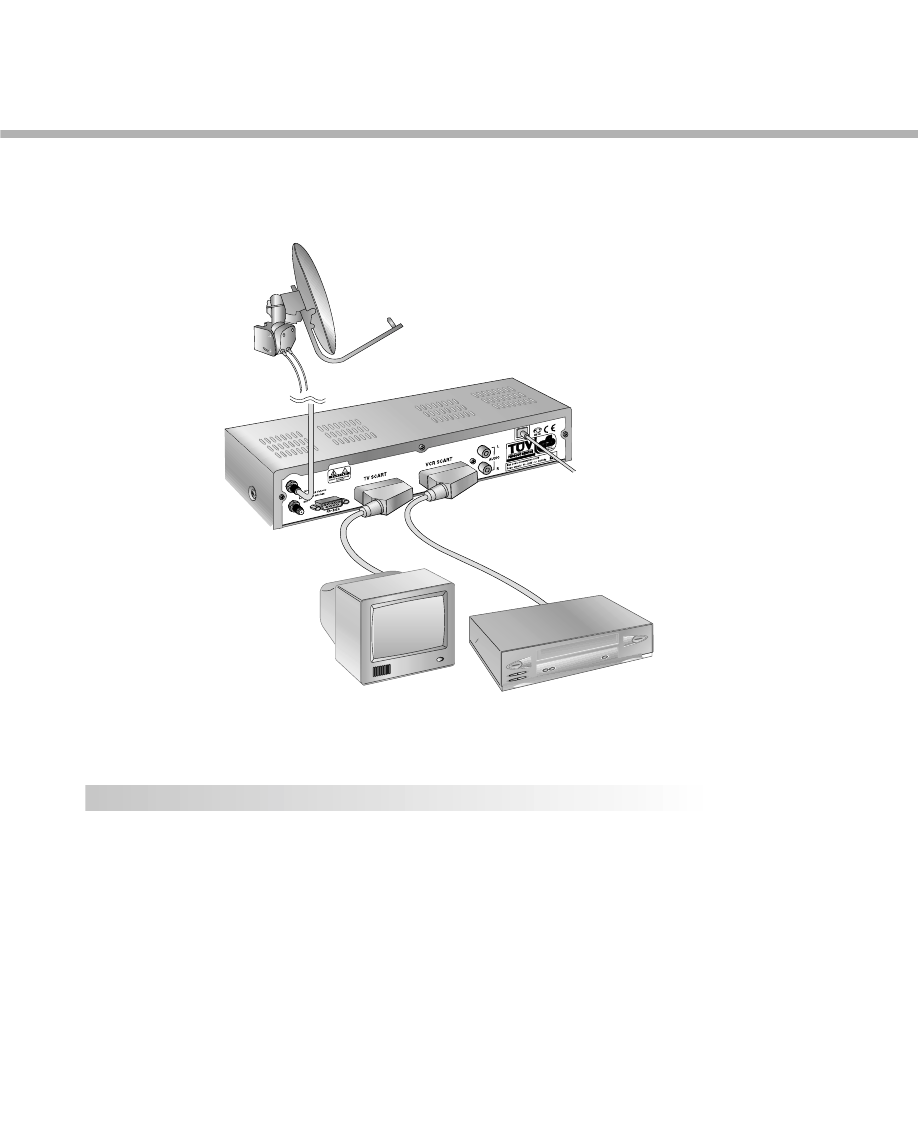
TV with VCR and Motorised System (DiSEqC 1.2)
1. Connect one end of a 21-pin SCART cable to the TV SCART connector on the STB and
the other end to a SCART socket on your TV.
2. Connect one end of a 21-pin SCART cable to the VCR SCART connector on the STB
and the other end to a SCART socket on your VCR.
3. Connect the coaxial cable from the LNB of your motorised system(DiSEqC 1.2 Motor)
to the LNB IN socket on the STB.
GB9
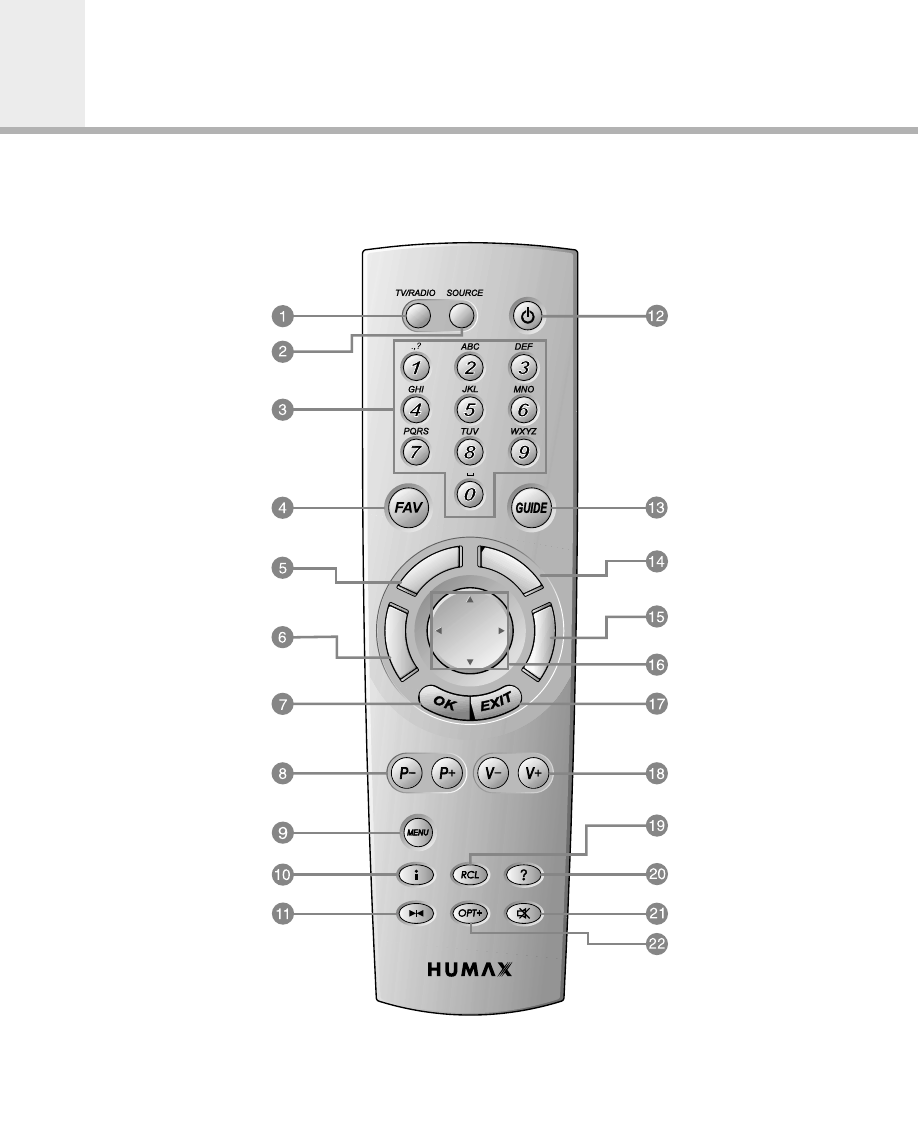
Remote Control Unit
TV/RADIO STANDBY
GUIDE
YELLOW
BLUE
EXIT
CURSOR
V-/V+
RCL (RECALL)
HELP
OPT+ (OPTION)
MUTE
SOURCE
NUMERIC BUTTONS
FAV (FAVOURITE)
GREEN
RED
OK
P-/P+
MENU
i (INFORMATION)
FREEZE
GREEN
RED
YELLOW
BLUE
GREEN
RED
YELLOW
BLUE
GB10
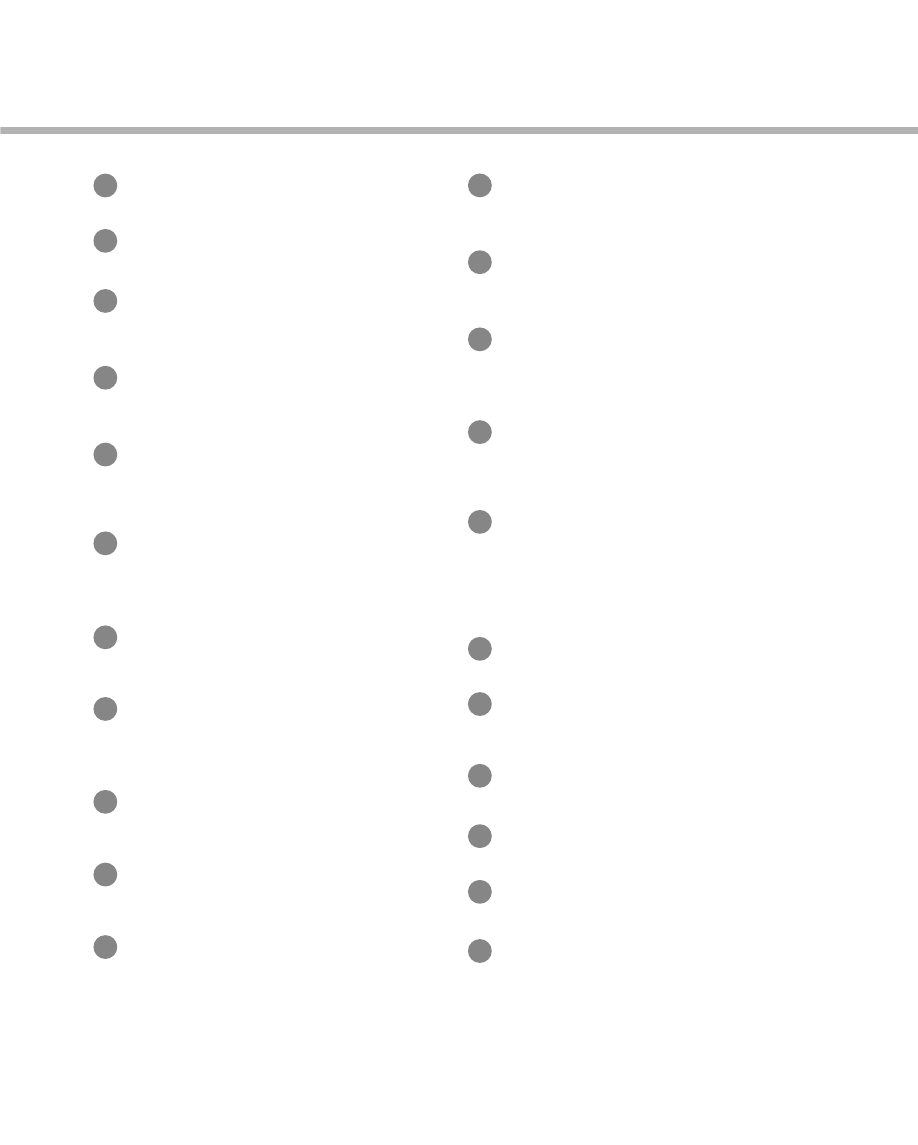
TV/RADIO
Press to switch between TV and Radio modes.
SOURCE
Press to select the TV/SAT mode.
NUMERIC BUTTONS
Press to select a service, enter your PIN code or
number on a menu.
FAV (FAVOURITE)
Press to see the current service configuration
or edit during A/V play.
GREEN
Press to select a Service Favourite in the Service
List. This button functions in the same way as the
GREEN button icon on a menu.
RED
Press to select a Service All in the Service List.
This button functions in the same way as the RED
button icon on a menu.
OK
Press to display the service list. This button can be
used to select the item on the menus.
P-/P+
Programme up/down buttons.
Press to move to the next or previous service.
Press to move up or down pages on a menu.
MENU
Press to display the Main Menu on the screen
or return to the screen from a sub menu screen.
i (INFORMATION)
Press to display the programme information box
on the screen.
FREEZE
Press once to freeze the screen picture.
Press again to return to normal mode.
STANDBY
Press to switch between Operation mode and
Standby mode.
GUIDE
Press to display the TV/Radio Electronic Programme
Guide
YELLOW
Press to select a Service Network in the Service
List. This button functions in the same way as the
YELLOW button icon on a menu.
BLUE
Press to select a Service Alphabet in the Service
List. This button functions in the same way as the
BLUE button icon on a menu.
CURSOR
Press to move the highlight bar for selecting
options on the menus.
This button can be used to change services
(up/down) and increase or decrease the audio
volume (left/right).
EXIT
Press to return to the previous menu or screen.
V-/V+
Volume up/down buttons.
Press to increase or decrease the volume.
RCL (RECALL)
Press to select the service previously viewed.
HELP
Press to display the help box on the screen.
MUTE
Press to cut the sound off temporarily.
OPT+(OPTION)
Press to enter the sub menu for selecting
Soundtrack and Subtitle.
This button can be used to reserve a
programme in the TV Guide.
112
13
14
15
16
17
18
19
20
21
22
2
3
4
5
6
7
8
9
10
11
•
Please note
: The design of the Remote Control Unit may be changed without advance notice.
GB11
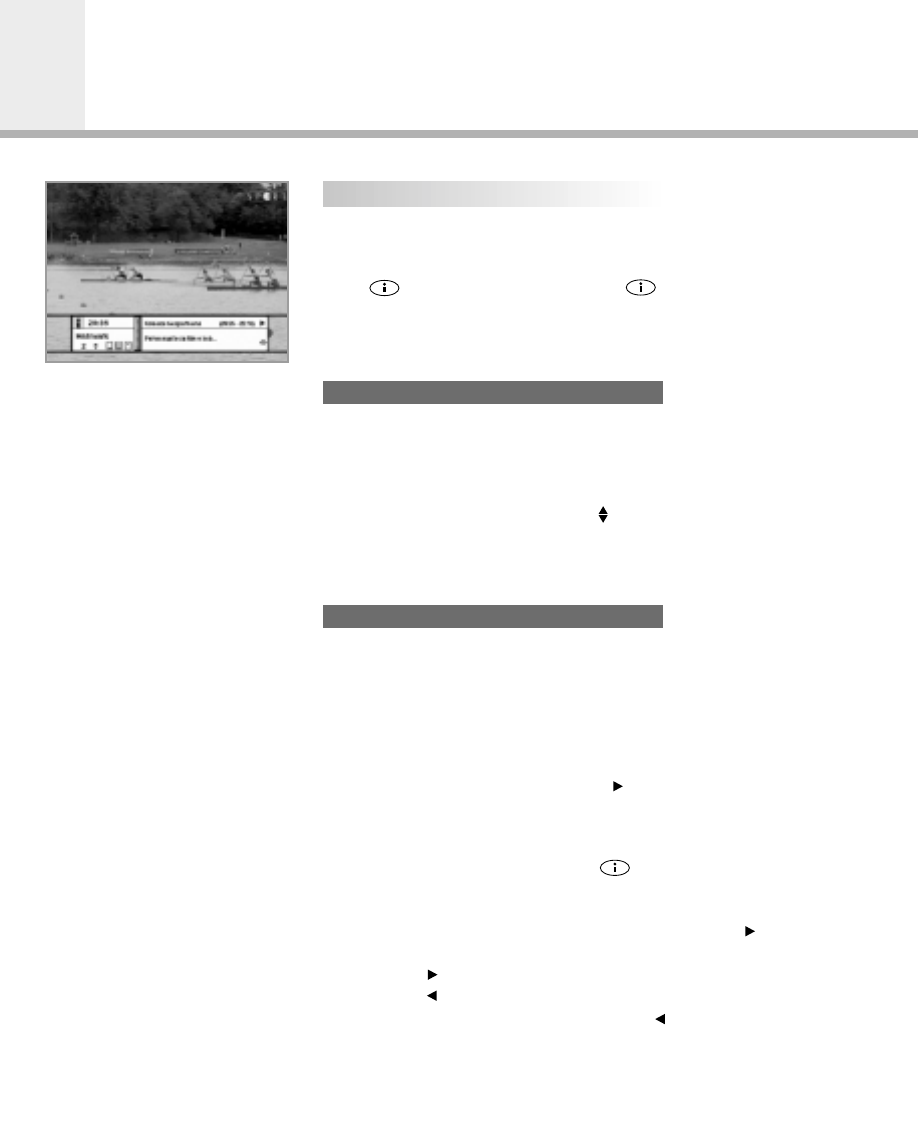
Function Guide
The detailed information on a service and its event is automatically
displayed at the bottom of the screen (I-Plate) whenever a service
changes. To obtain this information when watching a service, press
thei ( ) button. If you press the i ( ) button again while the
I-Plate is displayed, the I-Plate disappears.
The I-Plate is divided into a “service information” part and an “event
information” part.
The service information is situated on the left side of the I-Plate and
consists of the following items:
• Current Time, Dolby Digital Symbol if there is an available Dolby
service.
• Service name, Service Number, icon.
• Subtitle/Teletext/Scrambling symbol displayed according to the
service attributes.
• Progressive Signal Quality bar.
The event information is situated on the right side of the I-Plate and
consists of the following items:
• Event name and, duration time of the event.
• Description of the event, status of the reserved event.
There are two types of event information, present event
information and following event information.
If the following one is available, the icon is displayed.
To switch between the present and following ones, proceed as
follows,
1. Activate the I-Plate using the i ( ) button.
2. If the present event information is available, it is displayed on the
I-Plate.
3. If the following event information is available, the icon is
displayed.
4. Press the button to switch to the following event information.
5. Press the button to return to the present event information.
If the present one is not available, the icon is not displayed
and cannot return to from the following one.
Information Box (I-Plate)
Service Part
Event Part
GB12
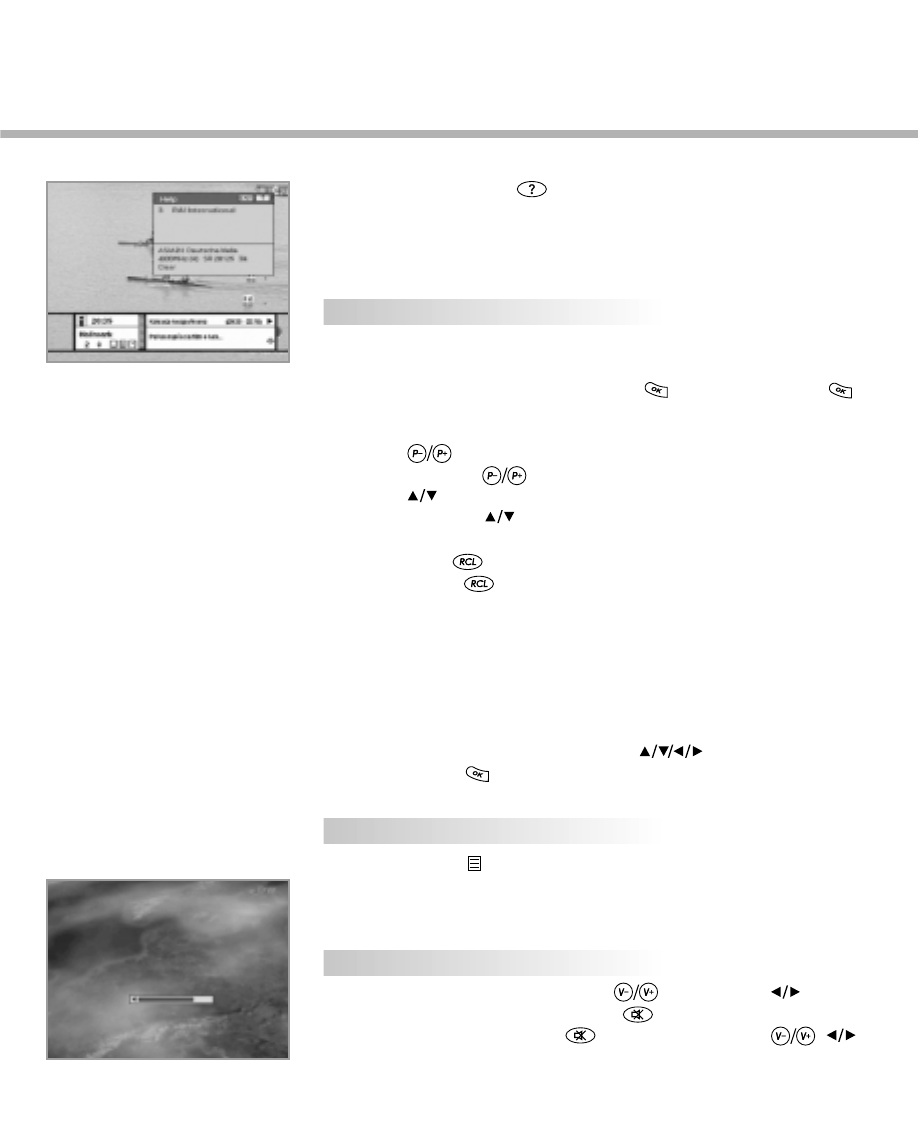
If you press the HELP ( ) button while the I-Plate is displayed,
the detailed description of the event will be displayed on the help
window instead of help messages. If there is no available data for
the detailed description on the air, the help message is displayed on
the help window instead.
There are several ways to change a service.
• Use the NUMERIC buttons: key in the service number using the
NUMERIC buttons and press the OK () button. If the OK ()
button is not pressed, the service is automatically changed to the
service number keyed in after about 5 seconds.
• Use the buttons: the service is changed up/down
sequentially if the button is pressed.
• Use the buttons: the service is changed up/down
sequentially if the button is pressed.
• Use the service list or Guide list: refer to the following description.
• Use the RCL () button: return to the latest viewed service
when the RCL () button is pressed.
There are two types of service, TV and RADIO.
To switch between them, press the TV/RADIO button.
To change a service in the service list or guide list, proceed as
follows:
1. Activate the service list or guide list.
(Refer to the following GB15, 17 pages on how to activate them)
2. Select the desired service using the button.
3. Press the OK () button, and the service is changed to the
desired one.
The TELETEXT () icon appears on the I-Plate if there is
available teletext data in the service.
(
NOTE:
The TV supports the teletext decoder internally for
watching it, since the teletext data is decoded by the TV.)
To adjust the volume level, use the button or the button.
To mute the audio, press the MUTE () button. To recover the
audio level, press the MUTE () button again, or the ,
button.
Changing Services
Volume Control
Teletext Service
GB13
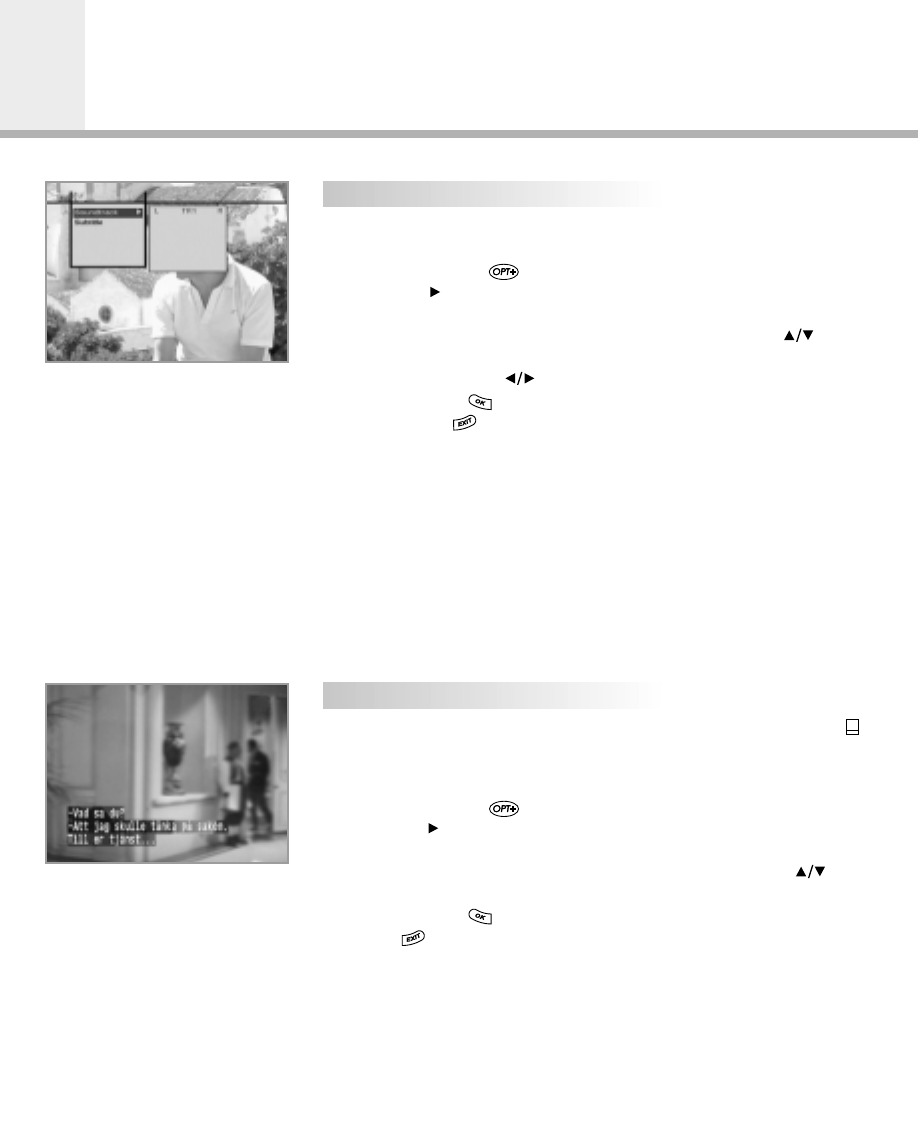
To change the audio language in the current service, proceed as
follows:
1. Press the OPT+ ( ) button and select the Soundtrack item.
2. Press the button to activate the list of supported audio
languages.
3. Select the desired audio language in the list using the keys.
4. Select the audio mode (mono, stereo, Dolby) in the desired audio
language using the buttons.
5. Press the OK () button to confirm the change,
or the EXIT ( ) button to cancel the change.
The selected audio language is preserved regardless of the
change of service.
If the selected audio language is invalid from some reason, the
default audio language will be selected. (The default audio language
can be set on the Language Setting in the Main menu.)
If an audio language is encoded by Dolby Digital, the Dolby Digital
Symbol will appear in the list of audio languages.
NOTE:
The Dolby decoder with optical port shall be connected
externally to decode the Dolby Digital audio.
If there is a subtitle service available on the air, the subtitle icon ( )
will appear in the I-Plate.
To select the subtitle language, proceed as follows:
1. Press the OPT+ ( ) button and select the Subtitle item.
2. Press the button to activate the list of supported subtitle
languages.
3. Select the desired subtitle language in the list using the
keys.
4. Press the OK () button to confirm the change or press the
EXIT ( ) button to cancel the change.
Soundtrack
Subtitle
Function Guide
GB14
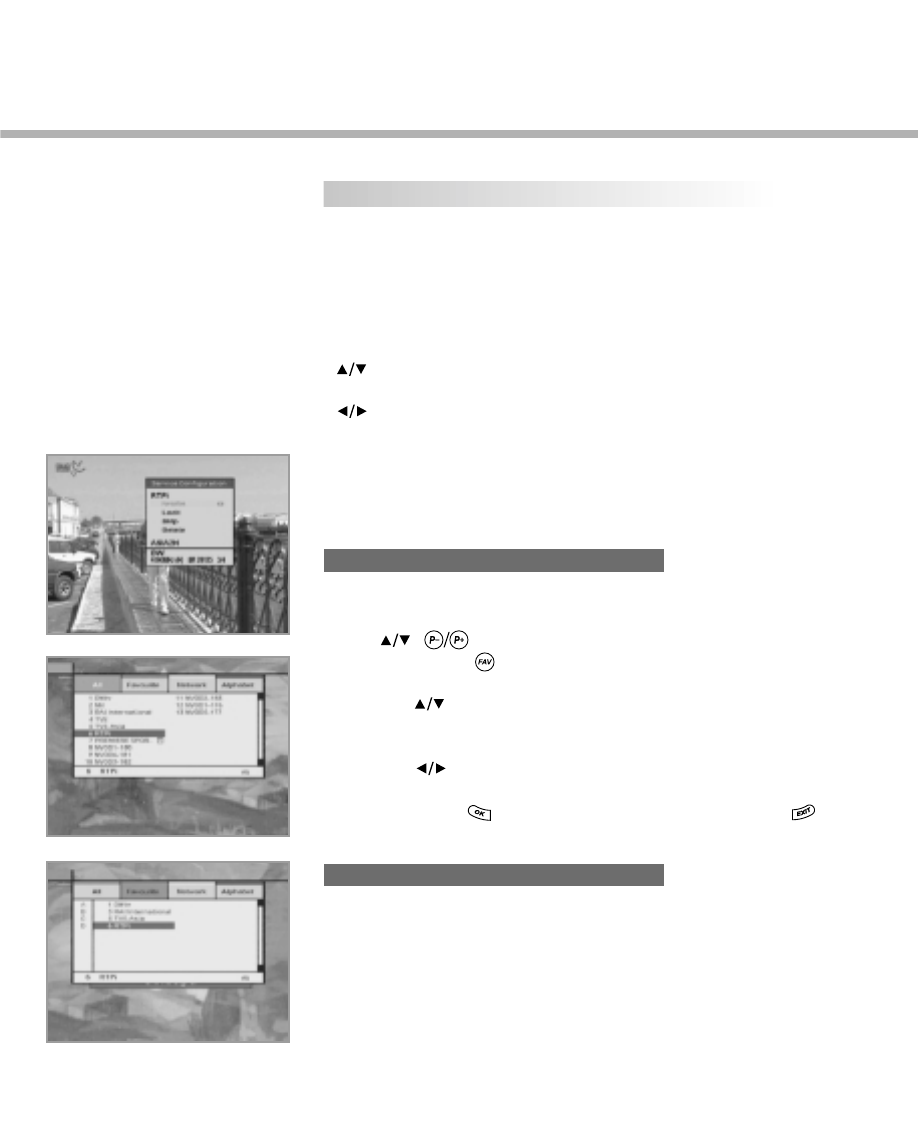
There are four service list types: All Service, Favourite Service,
Network Service and Alphabetical Order Service.
There is also a Configuration Service menu to change the
attributes of each service in the list.
In the service list, some buttons are used to switch the service list
type or select the service.
• buttons: Used to move the cursor up/down in the
service list.
• buttons: Used to move the cursor left/right in the
service list.
• RED button: Used to select the All type Service.
• GREEN button: Used to select the Favourite type Service.
• YELLOW button: Used to select the Network type Service.
• BLUE button: Used to select the Alphabetical Order Service.
To change the attributes of a service, proceed as follows:
1. Change to the service whose attributes are to be changed using
the , or other method.
2. Press the FAV ( ) button.
The Service Configuration Box then appears on the screen.
3. Use the buttons to select the desired one among the
attribute items (Favourite, Lock, Skip and Delete) in the Service
Configuration Box.
4. Use the buttons to enable/disable “LOCK”, “SKIP” or
“DELETE” to select the desired favourite group. When done,
press the OK ( ) button. To cancel, press the EXIT ( )
button.
The All Service list is a normal one, where the service list is
organised according to the order in which services are searched.
(The latest service will be added at the end of the service list.)
To select the “All Service” list, press the RED button with the
service list displayed.
If the RED button is pressed again in the All mode Service,
the service list toggles between Simple List and Advanced List.
Service List
Configuration Service
All Service
GB15

Services can be grouped in the favourite list. To add a service to a
group in the favourite list, the Configuration Service box or the
Service Organising menu in the main menu can be used.
(Refer to the related item for a more detailed description).
To select the “Favourite Service” list, press the GREEN button with
the service list displayed.
In the Network Service mode, the service list is organised according
to the network to which a service belongs.
To select the “Network Service” list, press the YELLOW button with
the service list displayed.
Whenever the YELLOW button is pressed in the “Network Service”
mode, the cursor will be toggled between the network name column
and the service name column.
When the cursor is in the network name list, the desired network
can be selected using the button.
All services belonging to the selected network will be listed in the
service name column.
In the Alphabetical Service mode, the list of services is given
alphabetically according to the service name.
To select the Alphabetical Service list, press the BLUE button with
the service list displayed.
Whenever the BLUE button is pressed in the Alphabetical Service
list, the cursor will be toggled between the alphabet character
column and the service name column.
When the cursor is in the alphabet character list, the desired
alphabet character can be selected using the button.
All services with the selected alphabet character as a first character
in the service name will be listed in the service name column.
Function Guide
Service Network
Service Favourite
Service Alphabetical
GB16
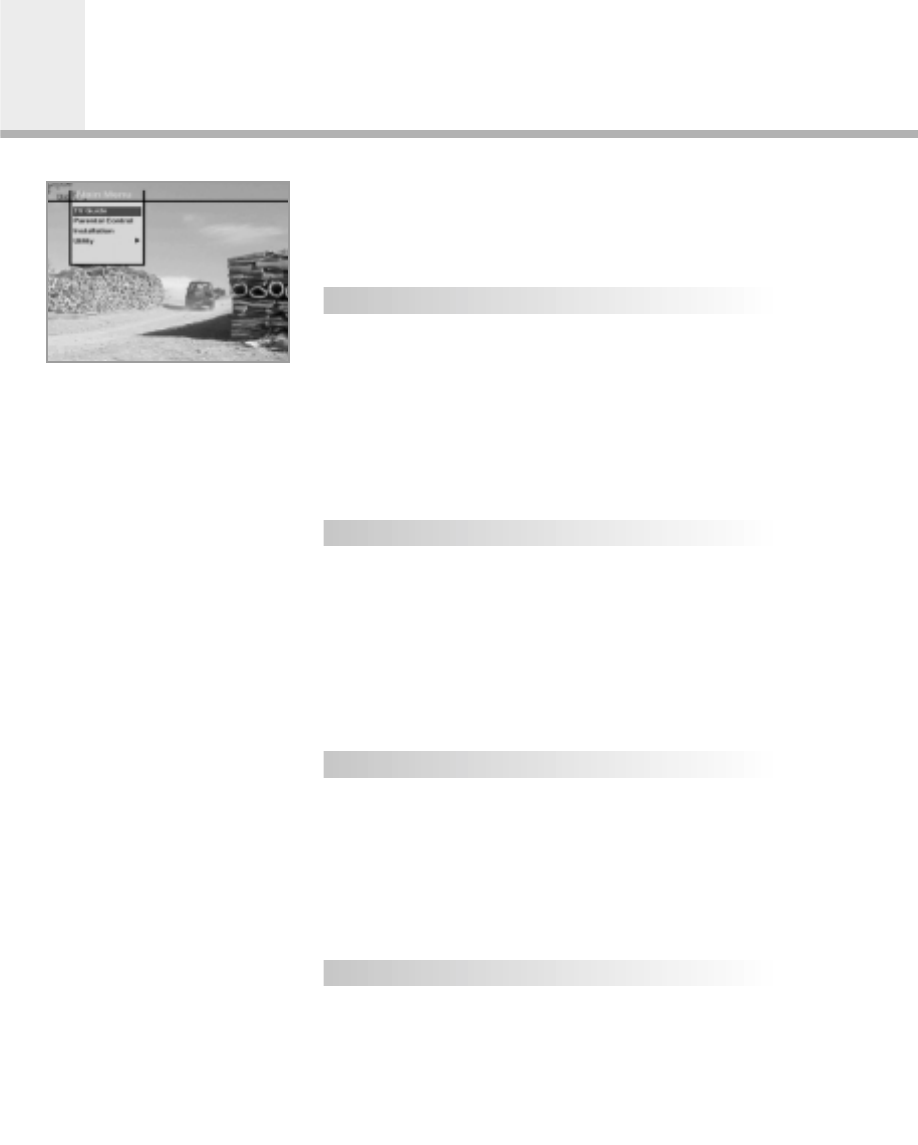
GB17
The Main menu contains the TV Guide, Parental Control, Installation
and Utility menus. (For more detailed information about menu
structure, please refer to the Menu Map page at the end of the
User’s Manual.)
The TV Guide is useful when all the services are being navigated,
since it offers all possible viewing options.
The TV Guide supplies the following information:
• Start/end time of all available services.
• Short description of all available services.
• Extended description of all available services.
For easy navigation, the TV Guide supplies 4 modes: Now, Weekly,
Reserved and Quick.
Parental Control offers all items related to the PIN code and
parental control.
• Censorship classification: the parental control level can be
specified.
• Change PIN: the PIN code can be modified.
The PIN code is an important password when reconfiguring the
STB, locking some services and giving access to the locked
services.
Installation offers the following functions:
• Reconfiguration of system settings.
• Organisation of service list.
• Search of services.
• System status.
• Information on the conditional access system.
• Restoration to the default setting.
Utility offers useful functions such as:
• Calendar.
• Biorhythm.
1. TV Guide
2. Parental Control
3. Installation
4. Utility
Main Menu Guide

Main Menu Guide
The TV Guide offers more detailed information on the service (both
TV and Radio services) such as start/end time, short description
and extended description. The service can be reserved in the TV
Guide.
To activate the TV Guide menu, do one of the following:
• Press directly the GUIDE ( ) button
• Select the TV Guide in the Main menu
If the TV/RADIO ( ) button is pressed with the TV Guide
displayed, the service list is toggled between the TV service and
Radio service.
There are 4 modes in TV Guide: NOW, WEEKLY, RESERVED and
QUICK.
• NOW: This mode displays information on the present services
and following services.
• WEEKLY: This mode displays information on all the services
for one week.
• RESERVED: This mode displays information on all the services
reserved by a user.
• QUICK: This mode displays information on the proceedings
of the current service while a full video screen is displayed
on the background.
The colour buttons are used to change the mode of the TV Guide.
• RED button: Used to select NOW mode.
• GREEN button: Used to select WEEKLY mode.
• YELLOW button: Used to select RESERVED mode.
• WHITE button: Used to select QUICK mode.
1. TV Guide
GB18
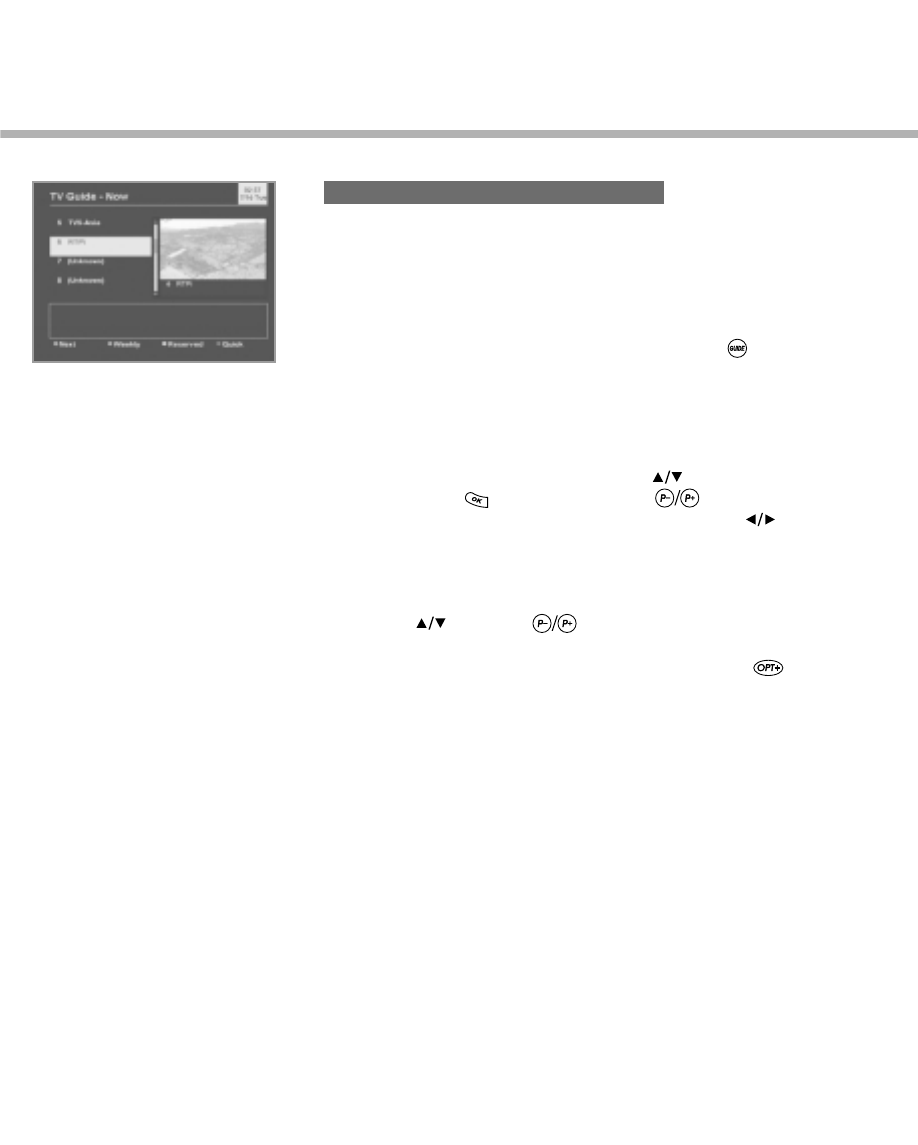
The NOW mode displays information on the present services
and following services. The information includes service name,
event name and start/end time of an event.
To activate the NOW mode and surf the services, proceed as
follows:
1. Activate the TV Guide menu using the GUIDE ( ) button or
via the Main menu.
2. Press the RED button to select the NOW mode. The NOW
mode contains a service list with information on the left side of
the screen, and the video is zoomed out on the right side of the
screen.
3. To watch the desired service, use the button to select it and
press the OK ( ) button, or use the button to select it.
(The service list can be paged-up/down using the button.)
The service then plays in the video zoomed out and the
associated information is displayed at the bottom of the screen.
To reserve a programme in the NOW mode, proceed as follows:
1. Use the button or button to select the desired
service.
2. If the desired service is selected, press the OPT+ ( ) button to
reserve it.
3. There are two modes in the reservation menu: “Daily” and
“Weekly”. “Daily” means that a service event will play daily,
and “Weekly” means that a service event will play weekly.
Now mode
GB19
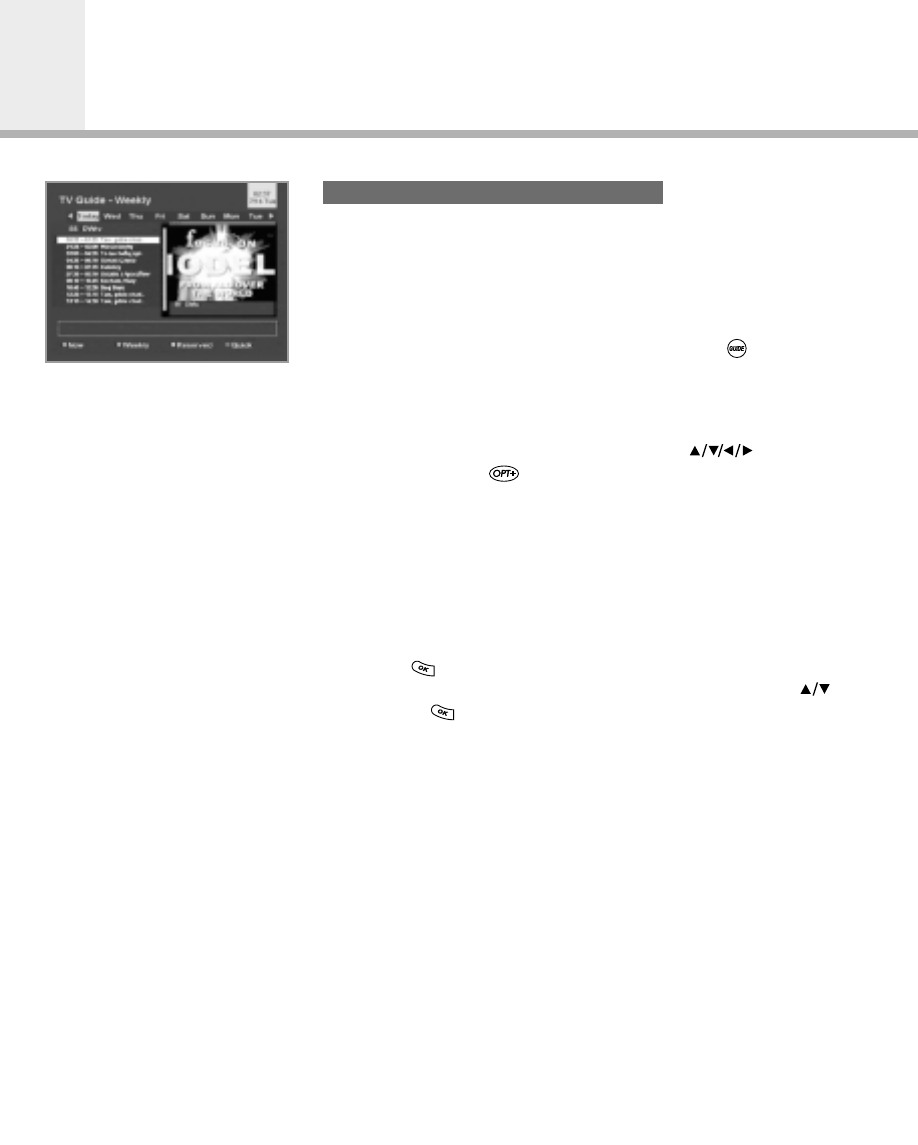
The WEEKLY mode displays information about all the services that
will be transmitted over a week.
The information includes service name, event name and start/end
time of the event.
To activate the WEEKLY mode, proceed as follows:
1. Activate the TV Guide menu using the GUIDE ( ) button or
via the Main menu.
2. Press the GREEN button to select WEEKLY mode.
To reserve a service event, proceed as follows:
1. Select the desired service event using the button.
2. Press the OPT+ ( ) button to reserve the event.
If the selected event is currently playing, there are two modes in the
reservation menu: “Daily” and “Weekly”.
If the selected event is playing in the future, there are three modes
in the reservation menu: ”Once”, “Daily” and “Weekly”.
In “Daily” mode, a service event will play daily.
In “Weekly” mode, a service event will play weekly.
In “Once” mode, a service event will play only once.
If the OK ( ) button is pressed, the small box with a service list
appears. The service can be changed in this box using the
and the OK ( ) buttons.
Weekly mode
Main Menu Guide
GB20
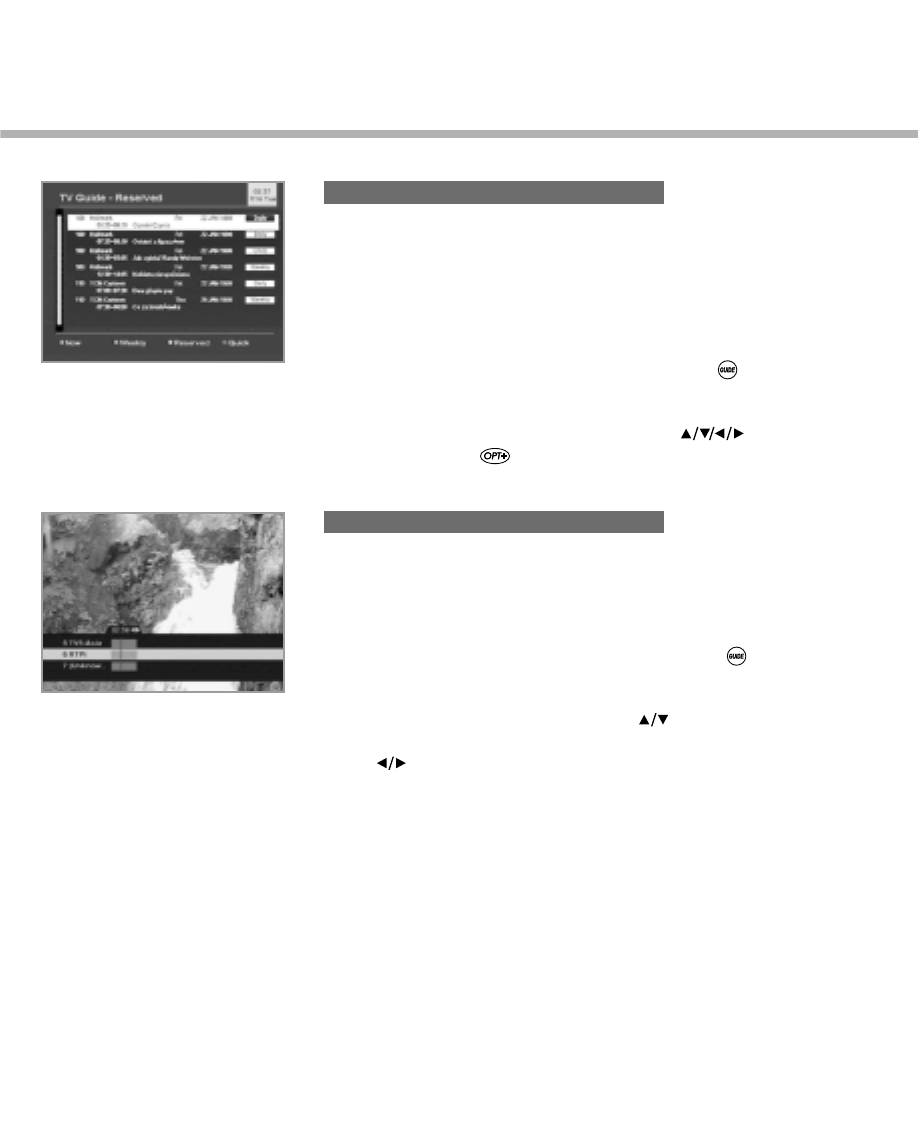
The RESERVED mode displays the services which have been
reserved.
In this mode, the reservation mode can be changed.
The service can also be removed from the reservation list.
To change the mode or remove a service event of, proceed as
follows in RESERVED mode:
• Activate the TV Guide menu using the GUIDE ( ) button or
via the Main menu.
• Press the YELLOW button to select the RESERVED mode.
• Select the desired service event using the buttons.
• Press the OPT+ ( ) to activate the reservation menu.
Next, change the mode or remove the event.
The QUICK mode displays information on the proceedings
of the current service while a full video screen is displayed in the
background.
To activate the QUICK mode, proceed as follows:
1. Activate the TV Guide menu using the GUIDE ( ) button or
via the Main menu.
2. Press the BLUE button to select QUICK mode.
3. Select the desired service using the button.
4. Select the desired event (present event or following event) using
the button.
The time line consists of three blocks, each block with a 30-minute
time-line.
The blue vertical line indicates the current time in the time-line.
The black and white bar indicates the start/end time of the event in
time-line.
(The bar will be black depending on the time the event took place.)
Reserved mode
Quick mode
GB21

Main Menu Guide
In the Parental Control menu, it is possible to change the Parental
Guidance Rating and the PIN code.
To set the Parental Guidance Rating, proceed as follows:
1. Activate the Parental Control menu via the Main menu.
(To activate it, the PIN code should be entered).
2. Select the Censorship classification item using the button.
3. Select the desired Parental Guidance Rating using the
button.
4. The Parental Guidance Rating is given as age-based numbers,
“no block”, “10”, “13”, “16”, “18” and “total block”.
5. Press the OK ( ) button to confirm the change.
** The default PIN code is .
To change the PIN code, proceed as follows:
1. Activate the Parental Control menu via the Main menu.
(To activate it, the PIN code should be entered).
2. Select the Old PIN code menu using the button.
3. Enter the Old PIN code using numeric buttons. When four digits
have been entered, the cursor will automatically be moved to the
New PIN code menu.
4. Enter the new PIN code in the New PIN code menu. When four
digits have been entered, the cursor will automatically be moved
to the Verify Changed PIN Code menu.
5. Enter the new PIN code again to verify it. If it is correct, then the
new PIN code will be saved. If incorrect, then the message
“PIN code mismatch” will be displayed.
The INSTALLATION menu supplies the following functions:
• Configuration of miscellaneous functions such as
Language Setting, Time Setting, etc.
• Organization of Service List
• Search for services
• Information on STB
2. Parental Control
0000
GB22
3. Installation
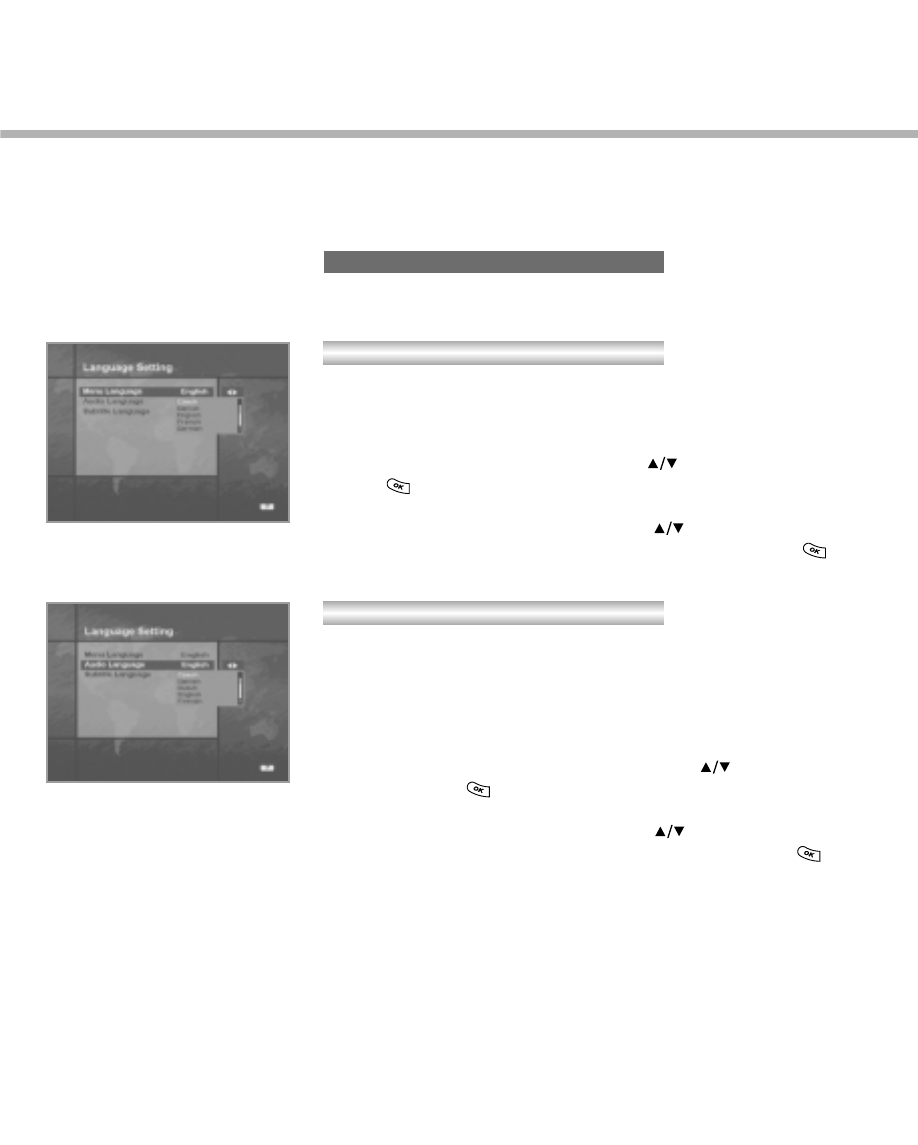
GB23
3-1. System Setting
This sub-menu supplies the miscellaneous functions.
The Language Setting menu supplies Menu Language, Audio
Language and Subtitle Language.
The menu language is a language used in the text of the menu.
To change the menu language, proceed as follows:
1. Activate the Language Setting menu via the Main menu.
2. Select the Menu Language using the button and press the
OK ( ) button.
3. When the small box with the supported language list appears,
select the desired language using the button.
4. If the desired menu language is selected, press the OK ( )
button to confirm.
The audio language is a language selected as a default
audio when a service is playing. It is also possible to change the
audio language via the Soundtrack menu in the Option List menu.
To change the audio language, proceed as follows:
1. Activate the Language Setting menu via the Main menu.
2. Select the Audio Language menu using the button and
press the OK ( ) button.
3. When the small box with the supported language list appears,
select the desired language using the button.
4. If the desired audio language is selected, press the OK( )
button to confirm.
Language Setting
Menu Language
Audio Language
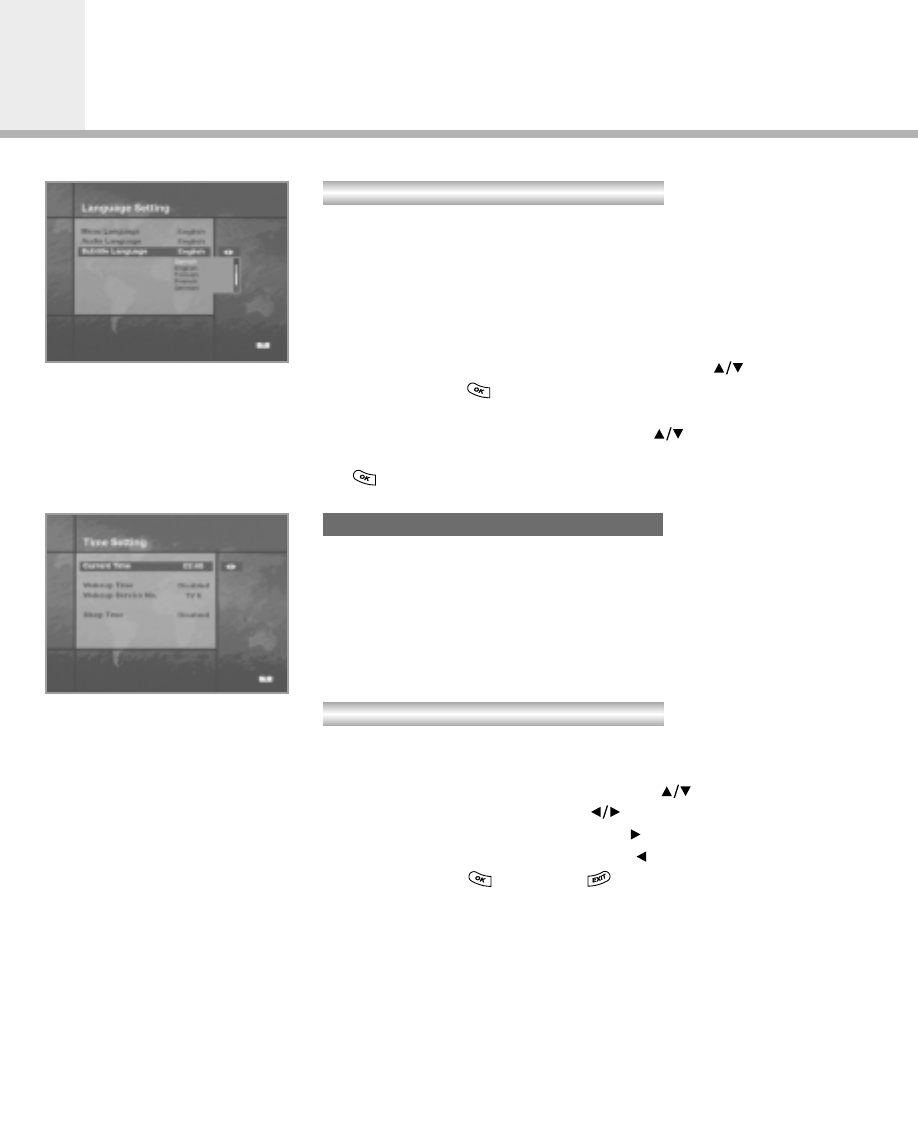
The subtitle language is a language selected as a default
when a service with subtitles is playing. It is also possible to change
the subtitle language via the Soundtrack menu in the Option List
menu.
To change the subtitle language, proceed as follows:
1. Activate the Language Setting menu via the Main menu.
2. Select the Subtitle Language menu using the button and
press the OK ( ) button.
3. When the small box with the supported language list appears,
select the desired language using the button.
4. If the desired subtitle language is selected, press the OK
( ) button to confirm it.
The Time Setting menu supplies the following functions:
• Set the current time.
• Disable/Enable the wake-up timer.
• Set the wake-up service. The wake-up service is a service
that will play when STB starts after a wake-up timer has expired.
• Disable/Enable the sleep timer.
To set the current time, proceed as follows:
1. Activate the Time Setting menu via the Main menu.
2. Select the Current Time item using the button.
3. Set the current time using the button (the current time
increases by 30 minutes when the button is pressed and
decreases by 30 minutes when the button is pressed.)
4. Press the OK ( ) or EXIT ( ) button to confirm.
Time Setting
Current Time
Main Menu Guide
GB24
Subtitle Language
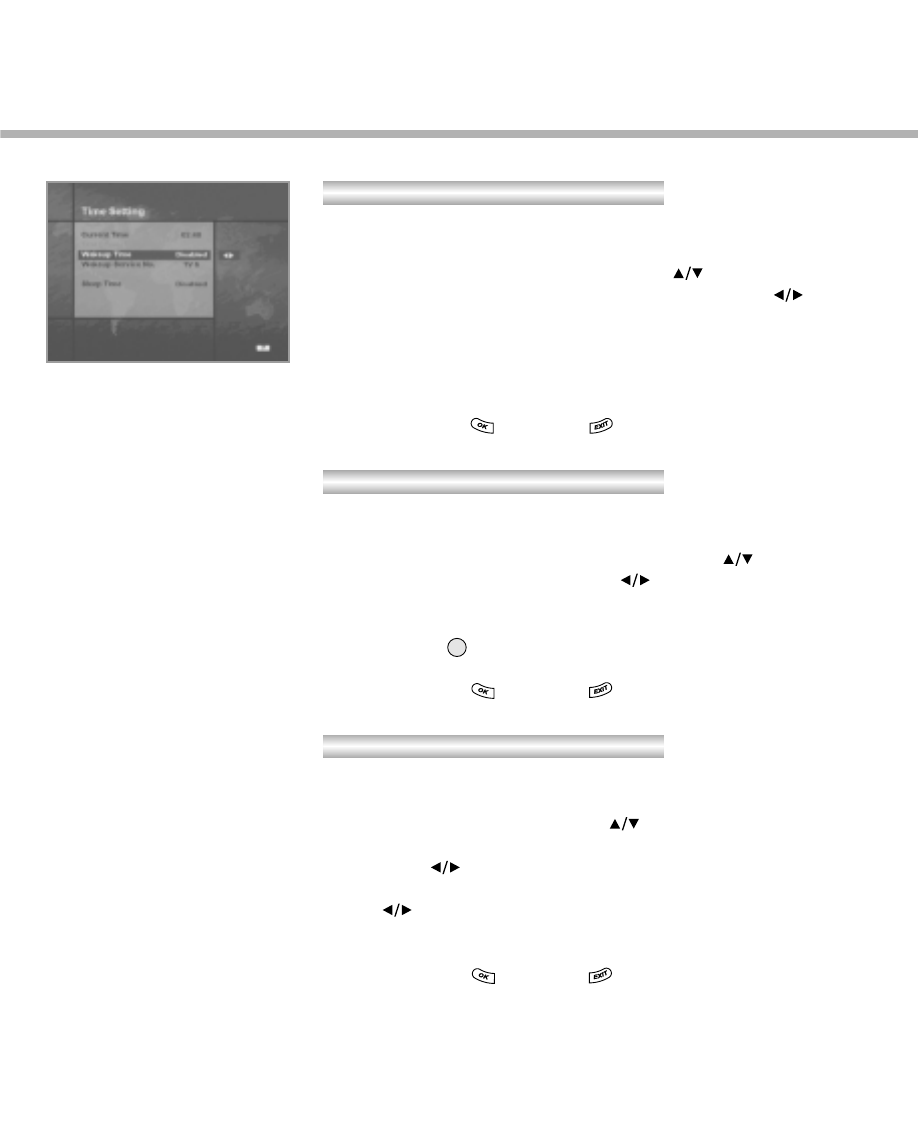
To disable or enable/set the wake-up timer, proceed as follows:
1. Activate the Time Setting menu via the Main menu.
2. Select the Wakeup Time item using the button.
3. To disable the wake timer, set to “Disable” using the
button.
4. To enable and set the wakeup timer, set the item to “00:00” using
the button. (The numeric mark, “0..9” appears on the right of the
Wake Time item). Set the desired wake-up time using
the NUMERIC buttons.
5. Press the OK ( ) or EXIT ( ) button to confirm.
To set the wake-up service, proceed as follows:
1. Activate the Time Setting menu via the Main menu.
2. Select the Wakeup Service No. item using the button.
3. Set the service number using the button or NUMERIC
buttons.
The service type (TV or RADIO) can be changed using the
TV/RADIO ( ) button. The service name is also displayed
under the Wakeup Service No. item.
4. Press the OK ( ) or EXIT ( ) button to confirm.
To disable or enable/set the sleep timer, proceed as follows:
1. Activate the Time Setting menu via the Main menu.
2. Select the Sleep Time using the button.
3. To disable the sleep timer, set the item to “Disable”
using the button.
4. To enable and set the sleep timer, set the item to “00:00” using
the button. (The numeric mark, “0...9” appears on the right
of the Sleep Time item) In this state, set the desired sleep time
using the NUMERIC buttons.
5. Press the OK ( ) or EXIT ( ) button to confirm.
Wakeup Service No.
Sleep Time
GB25
Wakeup Time
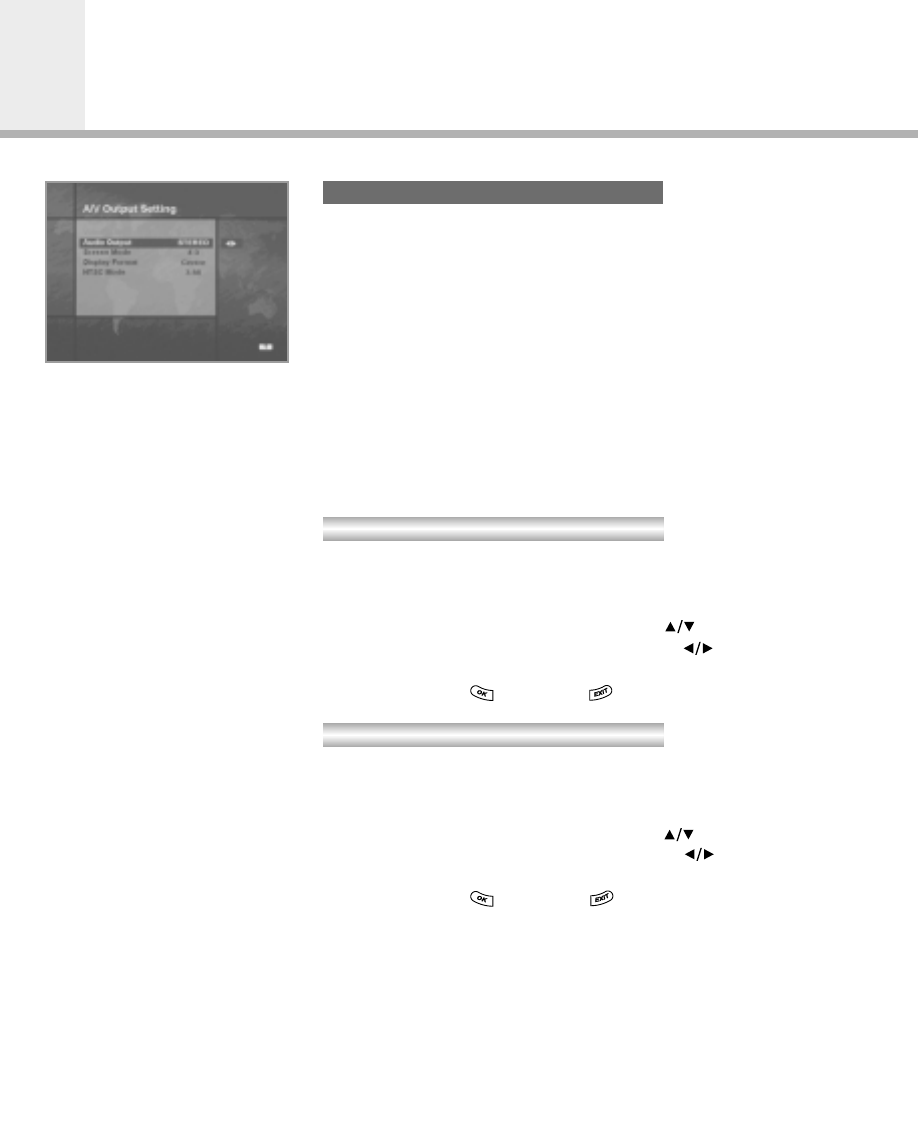
Main Menu Guide
The A/V Output Setting menu supplies menus that configure the
functions related to Audio and Video output.
• Configure the Video output of TV SCART as CVBS, S-VIDEO or
RGB mode.
• Configure the Audio output of TV SCART and RCA (Cinch) Jack
as Mono or Stereo mode.
• Configure the screen aspect ratio (4:3 or 16:9) of the TV connected
to STB.
• Configure the video display format (Centre or Letter-box) on the
TV.
• Configure the NTSC mode. There are two NTSC modes, NTSC
3.58 and NTSC 4.43. The NTSC 3.58 is more popular.
According to the TV type, select the suitable NTSC mode.
To configure the Video output mode of TV SCART, proceed as
follows:
1. Activate the A/V Output Setting via the Main menu.
2. Select the Video Output item using the button.
3. Select the desired video output using the button. There are
three modes: CVBS, S-VIDEO and RGB mode.
4. Press the OK ( ) or EXIT ( ) button to confirm.
To configure the audio output mode of TV SCART and RCA jack,
proceed as follows:
1. Activate the A/V Output Setting via the Main menu.
2. Select the Audio Output item using the button.
3. Select the desired audio output using the button.
There are two modes: STEREO and MONO.
4. Press the OK ( ) or EXIT ( ) button to confirm.
A/V Output Setting
Audio Output
Video Output (CVBS/S-Video/RGB)
GB26
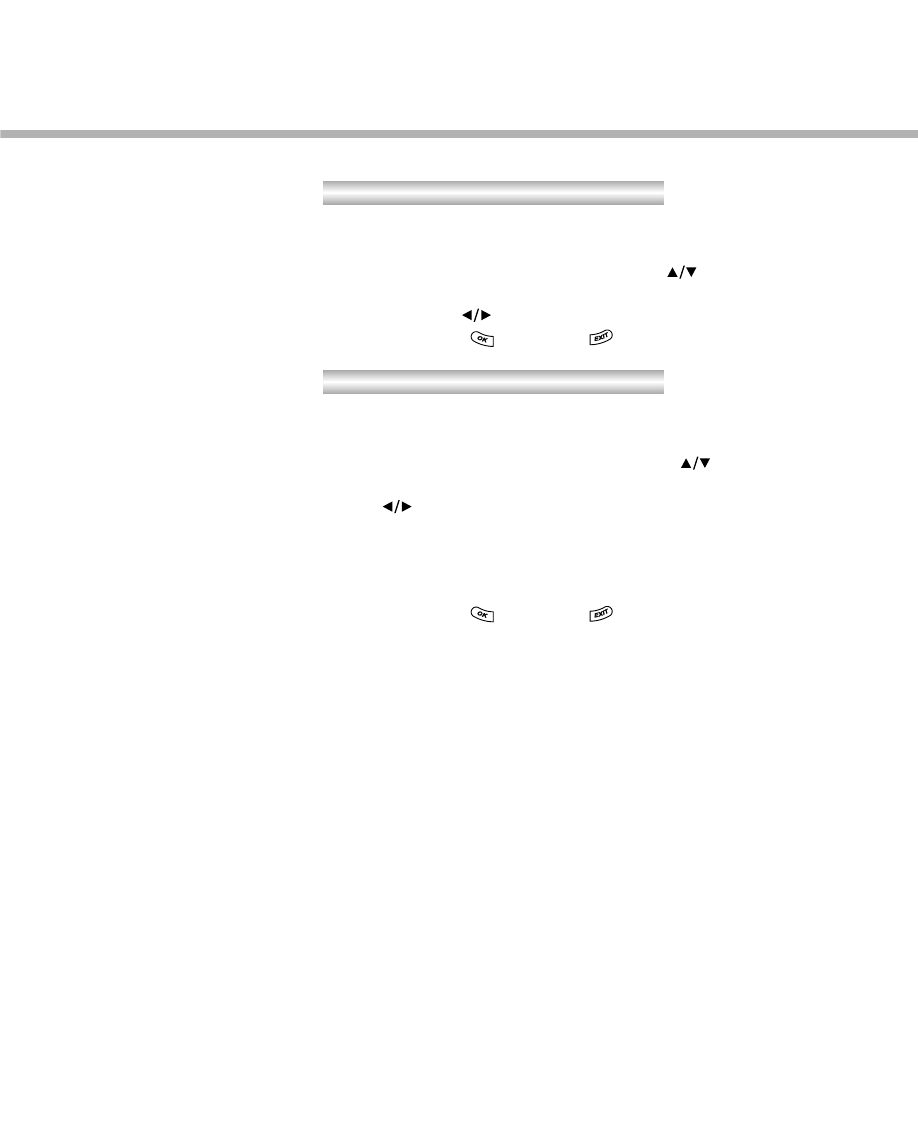
To configure the TV screen mode, proceed as follows:
1. Activate the A/V Output Setting via the Main menu.
2. Select the Screen Mode item using the button.
3. Select the desired TV screen mode according to the connected
TV using the button. There are two modes: 16:9 and 4:3.
4. Press the OK ( ) or EXIT ( ) button to confirm.
To configure the display format on the TV, proceed as follows:
1. Activate the A/V Output Setting via the Main menu.
2. Select the Display Format item using the button.
3. Select the desired display format depending on the TV using
the button. There are two mode pairs depending on the type
of TV. If the TV supports only the 4:3 mode, there is one mode
pair such as Centre and Letter-Box mode. If the TV supports the
16:9 mode, there is another mode pair such as Full and
Pillar-box mode.
4. Press the OK ( ) or EXIT ( ) button to confirm.
The display format can be appropriately configured according to the
selected Screen Mode.
If the Screen Mode is selected as 4:3, there are two modes, Centre
and Letter-box in the display format. If the video is formatted as
16:9 and the display format selected as Centre mode, the right and
left portions of the video are cut off to fit the 16:9 video into the 4:3
TV screen. If the video is formatted as 16:9 and the display format
selected as Letter-box mode, the video is vertically shrunk to fully
display on the 4:3 TV screen. In that state, the top and bottom of
the TV screen are blacked out. If the video is formatted as 4:3, the
display format is not applicable when the screen mode is selected
as 4:3.
Display Format
Screen Mode
GB27
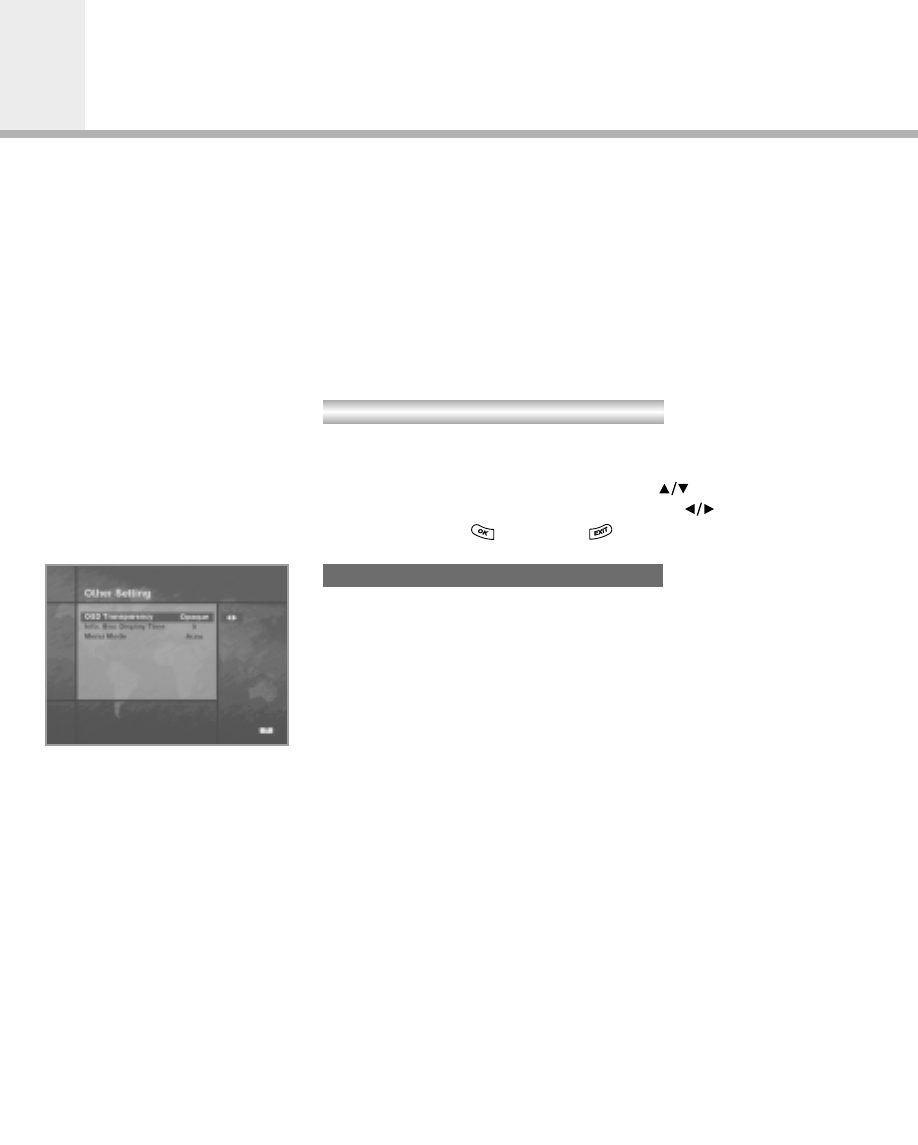
Main Menu Guide
If the Screen Mode is selected as 16:9, there are two modes, Full
and Pillar-box, in the display format. If the video is formatted as 4:3
and the display format selected as Full mode, the video is expanded
to fit the 4:3 video into the 16:9 TV screen. If the video is formatted
as 4:3 and the display format selected as Pillar-box mode, the video
is displayed on the centre of the 16:9 TV screen without
modification. The right and left sides of the TV screen are blacked
out. If the video formatted as 16:9, the display format is not
applicable when the screen mode is selected as 16:9.
To configure the NTSC mode on the TV, proceed as follows:
1. Activate the A/V Output Setting via the Main menu.
2. Select the NTSC Mode item using the button.
3. Select the desired NTSC Mode using the button.
4. Press the OK ( ) or EXIT ( ) button to confirm.
The Other Setting menu supplies the following functions:
• Set the level of OSD transparency. There are two levels:
opaque 50% transparent.
• Set the duration time of the Info. Box display. The duration time
can be set from 0 to 20 seconds.
• Set the Menu Mode, which changes the menu format according to
the video format (NTSC, PAL, Auto). If the TV supports only the
NTSC format, set the menu mode to NTSC. If the TV supports
only the PAL format, set the menu mode to PAL. If the menu mode
is set at Auto, the menu format is automatically changed
according to the format of the decoded video.
NTSC Mode
Other Setting
GB28
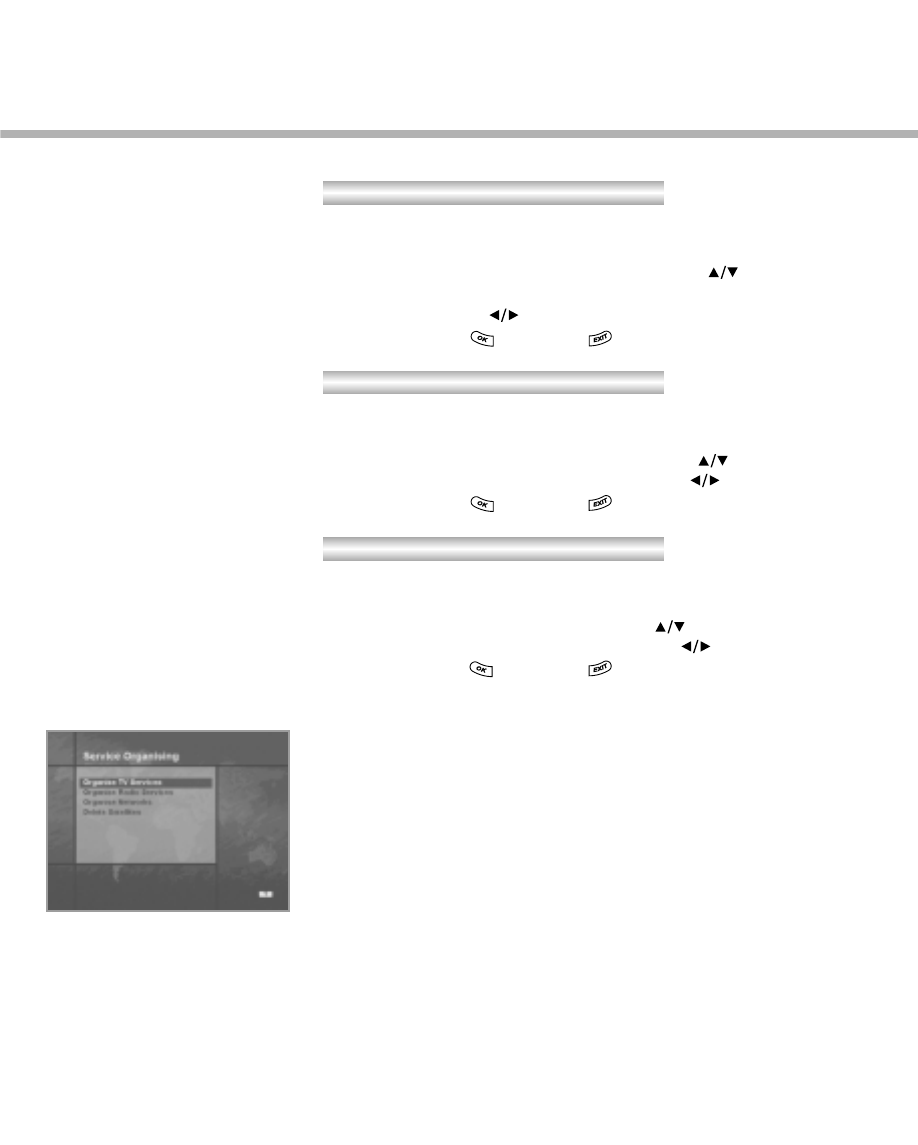
To set the OSD transparency, proceed as follows:
1. Activate the Other Setting menu via the Main menu.
2. Select the OSD Transparency item using the button.
3. Select the desired level between Opaque and Transparent
modes using the button.
4. Press the OK ( ) or EXIT ( ) button to confirm.
To set the duration time of Info. Box display, proceed as follows:
1. Activate the Other Setting menu via the Main menu.
2. Select the Info. Box Display Time using the button.
3. Select the desired duration time using the button.
4. Press the OK ( ) or EXIT ( ) button to confirm.
To set the menu mode, proceed as follows:
1. Activate the Other Setting menu via the Main menu.
2. Select the Menu Mode item using the button.
3. Select the desired menu mode using the button.
4. Press the OK ( ) or EXIT ( ) button to confirm.
3-2 Service Organising
The Service Organising menu supplies several organising methods:
• Organisation of TV services,
• Organisation of Radio services,
• Organisation of services sorted by a network name,
• Deletion of services belonging to a satellite.
OSD Transparency
Info. Box Display Time
Menu Mode
GB29
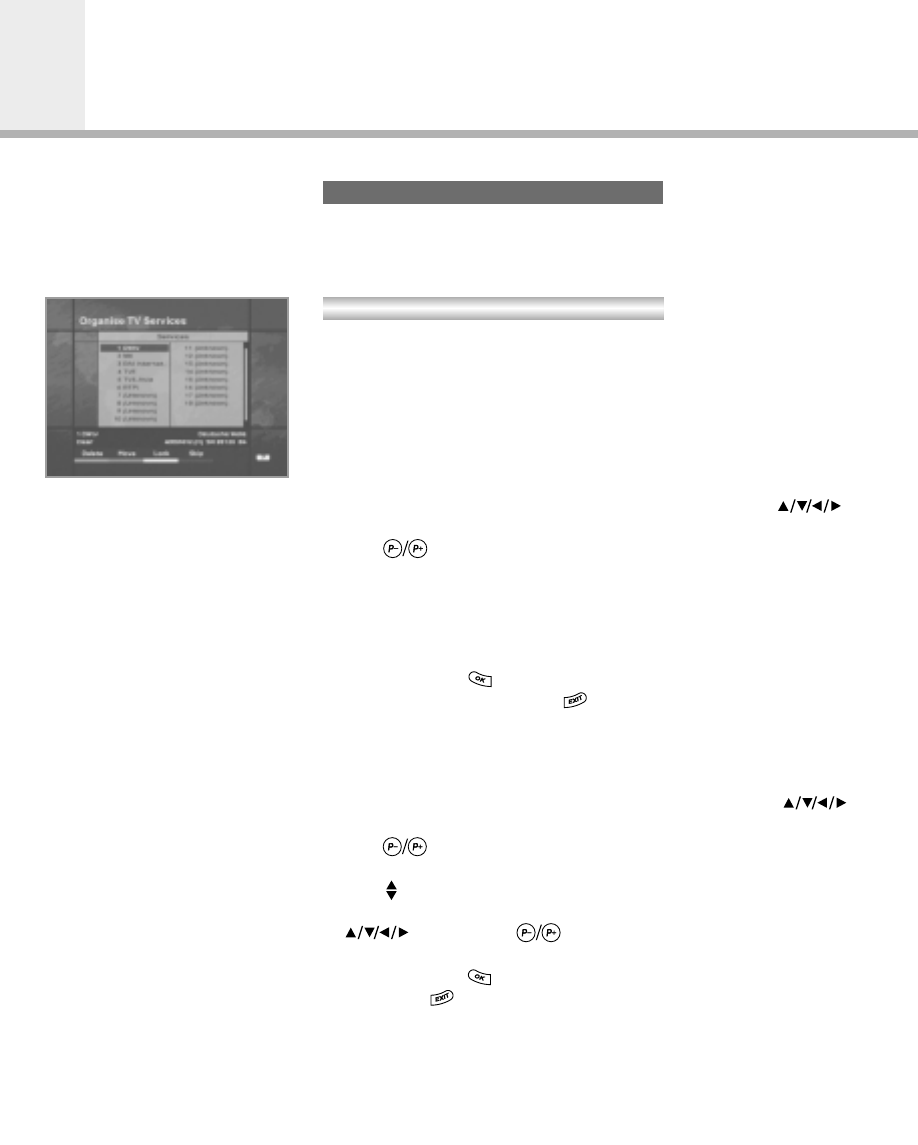
Main Menu Guide
The Organise TV services menu supplies two organisation
methods: Organise All Services and Organise Favourites.
Each offers a method of organisation with its own characteristics.
The services are sorted according to the service number in the
Organise All Services menu.
Each service can be deleted from the TV service list, moved to
another position, locked or skipped when zapping the service.
To delete the service from the service list, proceed as follows:
1. Activate the Organise All Services menu for TV services via
the Main menu.
2. Select the desired service in the service list using the
button.
The button can be used to page up/down the service list.
3. Press the RED button while the desired service is selected.
The service is then marked in grey.
4. Mark all the desired services using the above method. If a service
is to be left unmarked, select it and press the RED button
again (i.e. the RED button toggles the grey mark.)
5. Press the OK ( ) button to delete all the marked services,
otherwise press the EXIT ( ) button to cancel.
To move a service to another position in the service list, proceed as
follows:
1. Activate the Organise All Services menu via the Main menu.
2. Select the desired service in the service list using the
button.
The button can be used to page up/down the service list.
3. Press the GREEN button while the desired service is selected.
The icon then appears beside the service number.
4. Move the selected service to the desired position using the
button. The button can be used to move across
a page in the service list.
5. Press the OK ( ) or GREEN button to confirm, otherwise press
the EXIT ( ) button to cancel.
Organise All Services
GB30
Organise TV Services
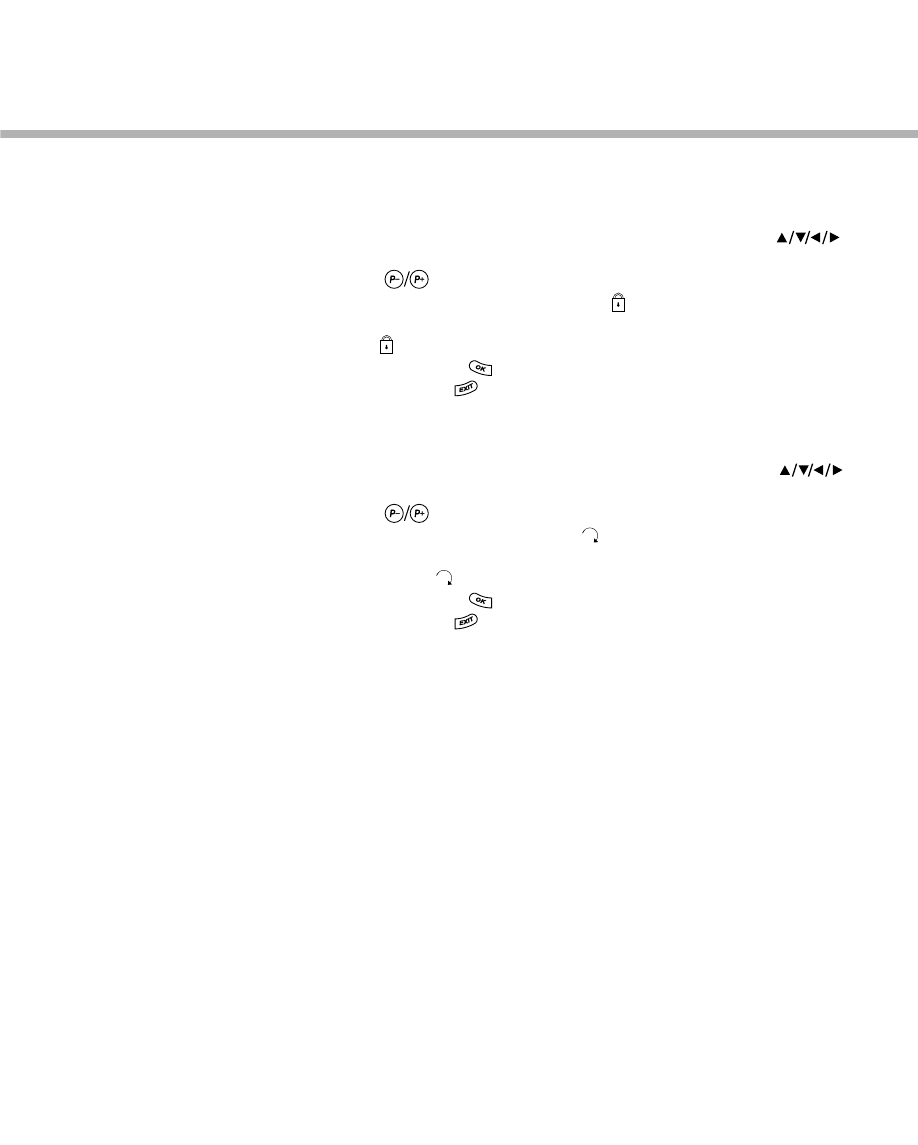
GB31
To lock a service in the service list, proceed as follows:
1. Activate the Organise All Services menu via the Main menu.
2. Select the desired service in the service list using the
button.
3. The button can be used to page up/down the service list.
4. Press the YELLOW button. The icon then appears at the end
of the service name. If the YELLOW button is pressed again,
the icon disappears.
5. Press the OK ( ) button to confirm
or the EXIT ( ) button to cancel.
To skip the service when zapping it, proceed as follows:
1. Activate the Organise All Services menu via the Main menu.
2. Select the desired service in the service list using the
button.
3. The button can be used to page up/down the service list.
4. Press the BLUE button. The icon then appears at
the end of the service name. If the BLUE button is pressed
again, the icon disappears.
5. Press the OK ( ) button to confirm
or the EXIT ( ) button to cancel.
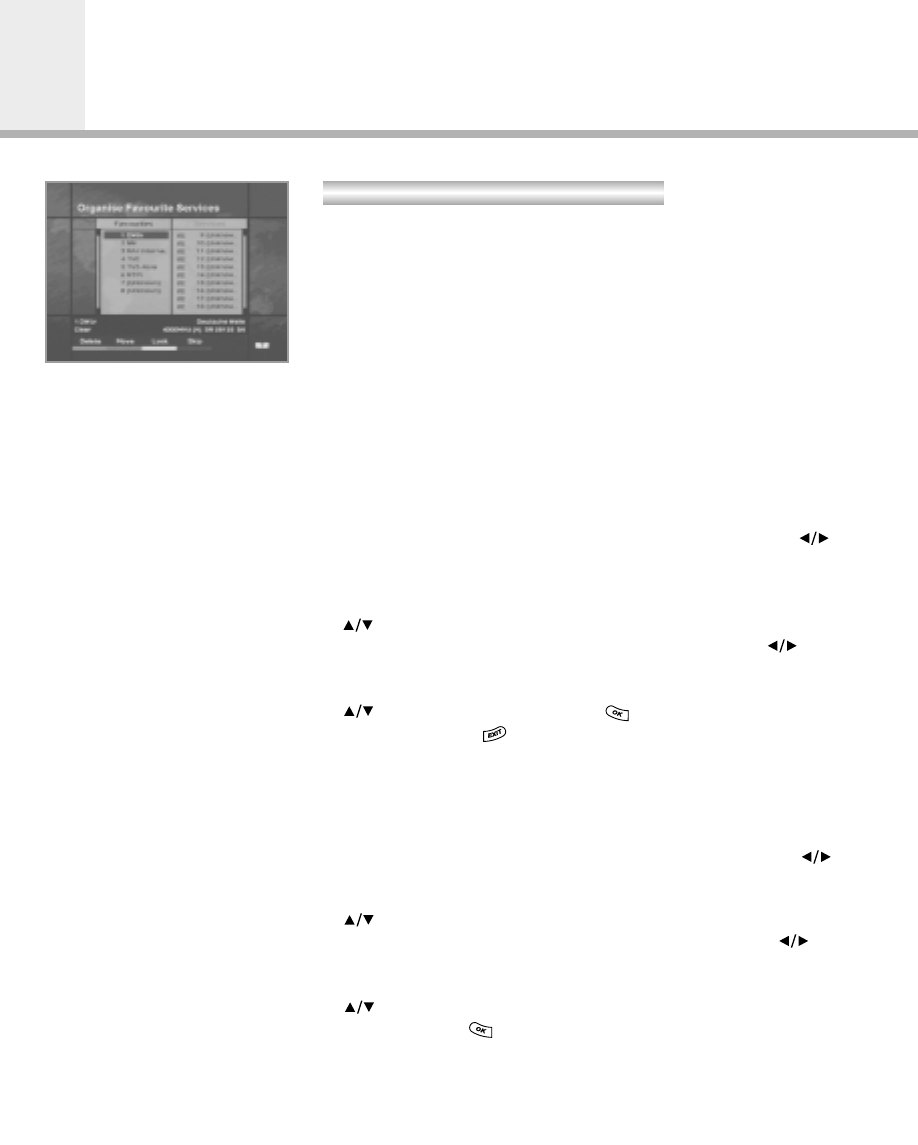
The services are sorted according to favourite groups in the
Organise Favourites menu.
There are three columns: the favourite group column,
the favourite list column and the service list column containing
services not belonging to any favourite group.
The Organise Favourites menu supplies the following functions:
• Add a service to a favourite group.
• Remove a service from a favourite group.
• Move a service to another position in a favourite list.
• Lock a service in a favourite list.
• Skip a service in a favourite list when zapping the service.
To add a service to a favourite group, proceed as follows:
1. Activate the Organise Favourite menu for TV services via the
Main menu.
2. Move the cursor to the favourite group column using the
button. If the favourite group column is selected, the column is
highlighted.
3. Select a favourite group in the favourite group column using the
button.
4. Move the cursor to the service list column using the button.
If the service list column is selected, the column is highlighted.
5. Select the desired service in the service list column using the
button, then press the OK ( ) button to move it.
6. Press the EXIT ( ) button to confirm.
To remove a service from a favourite group, proceed as follows:
1. Activate the Organise Favourites menu for TV services via the
Main menu.
2. Move the cursor to the favourite group column using the
button. If the favourite column is selected, the column is
highlighted.
3. Select a favourite group in the favourite group column using the
button.
4. Move the cursor to the favourite list column using the button.
If the favourite list column is selected, the column is highlighted.
5. Select the desired service in the favourite list column using the
button and press the RED button to mark the service.
6. Press the OK ( ) button to remove the marked services from a
favourite list.
Main Menu Guide
GB32
Organise Favourite Services
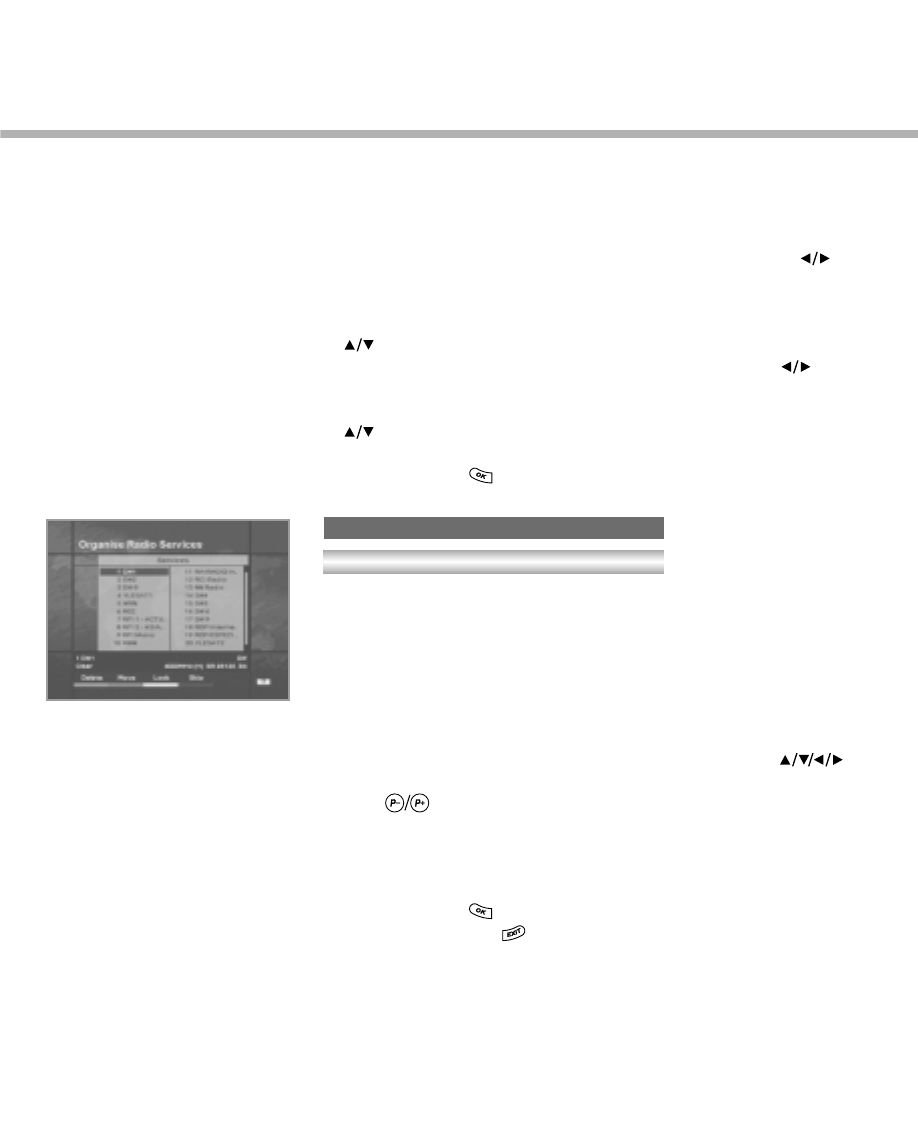
To skip or lock a service in a favourite list, proceed as follows:
1. Activate the Organise Favourites menu for TV services via the
Main menu.
2. Move the cursor to the favourite group column using the
button.
If the favourite column is selected, the column is highlighted.
3. Select a favourite group in the favourite group column using the
button.
4. Move the cursor to the favourite list column using the button.
If the favourite list column is selected, the column is highlighted.
5. Select the desired service in the favourite list column using the
button and press the YELLOW/BLUE button to lock/skip the
service. To undo the action, press the button again.
6. Press the OK ( ) button to confirm.
The services are sorted according to the service number in the
Organise All Service menu.
Each service can be deleted from the RADIO service list, moved to
other position, locked or skipped when zapping the service.
To delete the service from the service list, proceed as follows:
1. Activate the Organise All Services menu for RADIO services
via the Main menu.
2. Select the desired service in the service list using the
button.
The button can be used to page up/down the service list.
3. Press the RED button. The service is then marked in grey.
4. Mark all desired services using the above method. If a service is
to be left unmarked, select it and press the RED button again.
The RED button toggles the grey mark.
5. Press the OK ( ) button to delete all marked services.
or press the EXIT ( ) button to cancel.
Organise Radio Services
Organise All Services
GB33
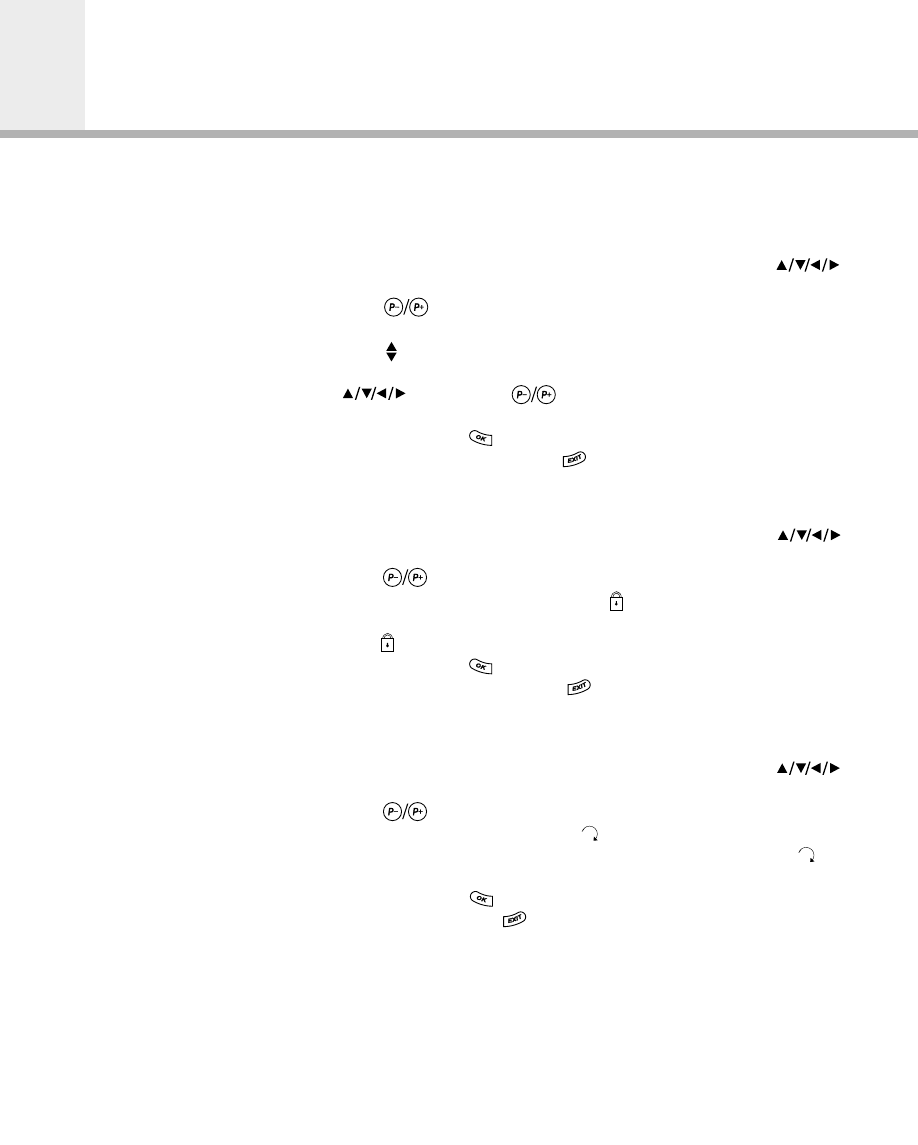
To move a service to another position in the service list, proceed as
follows:
1. Activate the Organise All Services menu via the Main menu.
2. Select the desired service in the service list using the
button.
The button can be used to page up/down the service list.
3. Press the GREEN button with the desired service selected.
The icon then appears beside of the service number.
4. Move the selected service to the desired position using the
button. The button can be used to move across a
page in the service list.
5. Press the OK ( ) or GREEN button to confirm,
otherwise press the EXIT ( ) button to cancel.
To lock the service in the service list, proceed as follows:
1. Activate the Organise All Services menu via the Main menu.
2. Select the desired service in the service list using the
button.
The button can be used to page up/down the service list.
3. Press the YELLOW button. The icon then appears at the end
of the service name. If the YELLOW button is pressed again,
the icon disappears.
4. Press the OK ( ) button to confirm.
Otherwise press the EXIT ( ) button to cancel.
To skip the service in zapping the service, proceed as follows:
1. Activate the Organise All Services menu via the Main menu.
2. Select the desired service in the service list using the
button.
The button can be used to page up/down the service list.
3. Press the BLUE button. The icon then appears at the end of
the service name. If BLUE button is pressed again, the icon
disappears.
4. Press the OK ( ) button to confirm
or press the EXIT ( ) button to cancel.
Main Menu Guide
GB34
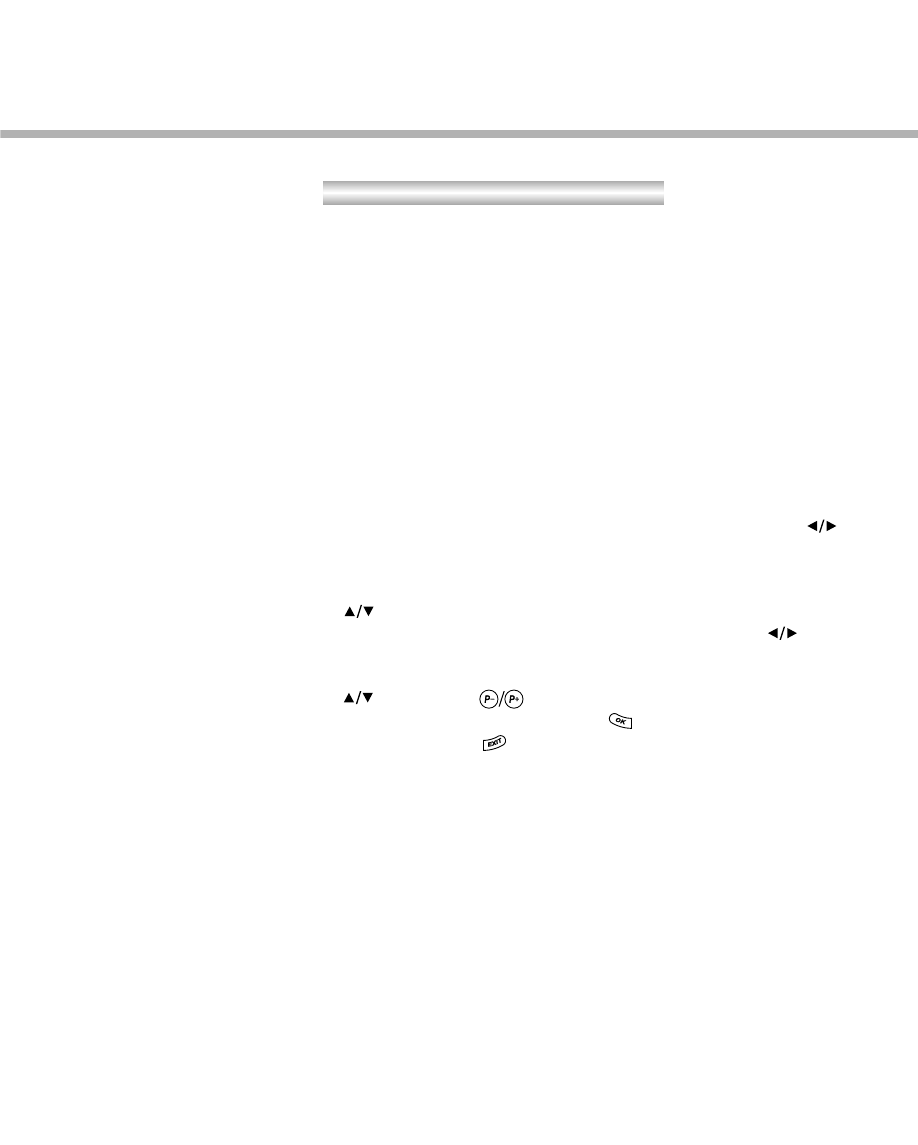
The services are sorted according to the favourite groups in the
Organise Favourites menu. There are three columns: the favourite
group column, the favourite list column and the service list column
containing services that do not belong to any favourite group.
The Organise Favourites menu supplies the following functions:
• Add a service to a favourite group.
• Remove a service from a favourite group.
• Move a service to another position in a favourite list.
• Lock a service in a favourite list.
• Skip a service in a favourite list when zapping the service.
To add a service to a favourite group, proceed as follows:
1. Activate the Organise Favourites menu for RADIO services via
the Main menu.
2. Move the cursor to the favourite group column using the
button. If the favourite group column is selected, the column is
highlighted.
3. Select a favourite group in the favourite group column using the
button.
4. Move the cursor to the service list column using the button.
If the service list column is selected, the column is highlighted.
5. Select the desired service in the service list column using the
button. The button can be used to page up/down the
service list. Then press the OK ( ) button to move it.
6. Press the EXIT ( ) button to confirm.
Organise Favourite Services
GB35
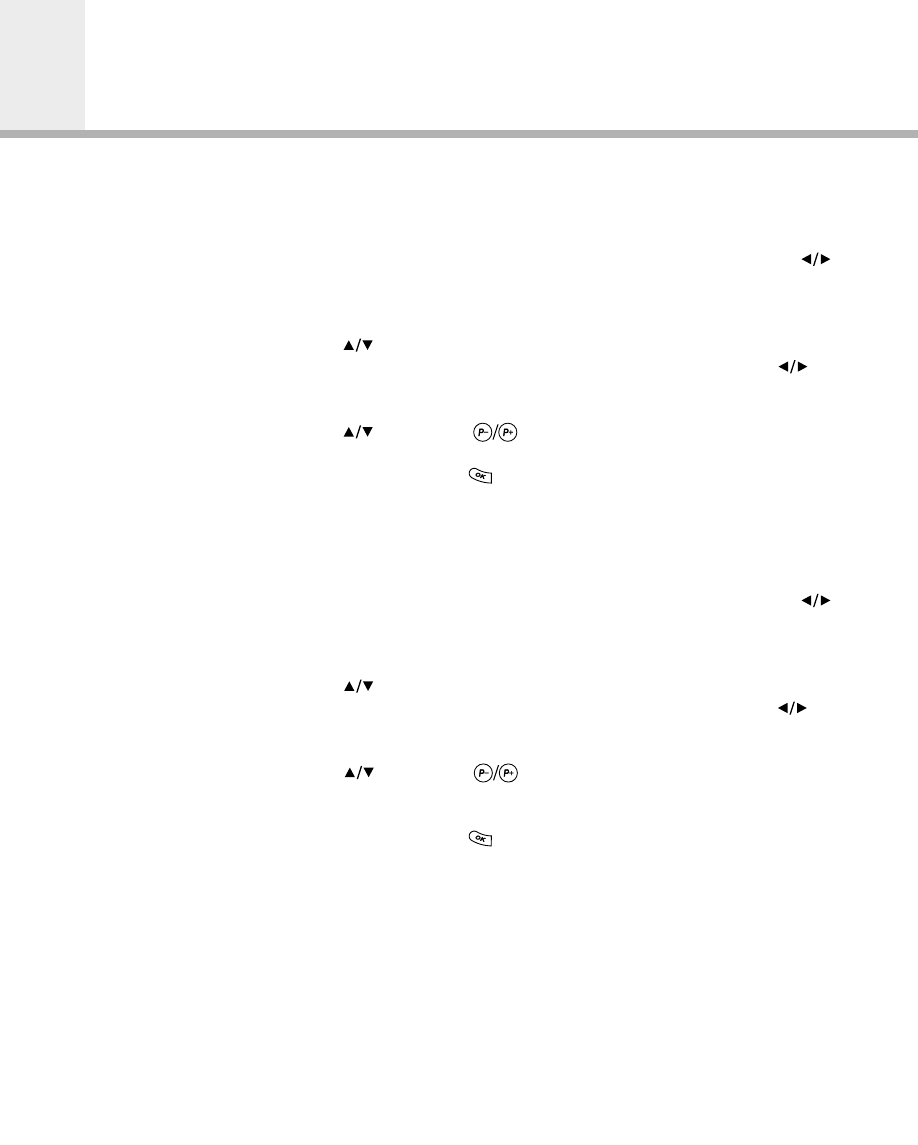
Main Menu Guide
To remove a service from a favourite group, proceed as follows:
1. Activate the Organise Favourite menu for RADIO services via
the Main menu.
2. Move the cursor to the favourite group column using the
button.
If the favourite column is selected, the column is highlighted.
3. Select a favourite group in the favourite group column using the
button.
4. Move the cursor to the favourite list column using the button.
If the favourite list column is selected, the column is highlighted.
5. Select the desired service in the favourite list column using the
button (the button can be used to page up/down the
service list) and press the RED button to mark the service.
6. Press the OK ( ) button to remove the marked services from a
favourite list.
To skip or lock a service in a favourite list, proceed as follows:
1. Activate the Organise Favourite menu for RADIO services via
the Main menu.
2. Move the cursor to the favourite group column using the
button.
If the favourite column is selected, the column is highlighted.
3. Select a favourite group in the favourite group column using the
button.
4. Move the cursor to the favourite list column using the button.
If the favourite list column is selected, the column is highlighted.
5. Select the desired service in the favourite list column using the
button (the button can be used to page up/down the
service list) and press the YELLOW/BLUE button to lock/skip the
service. Press the button again to undo the action.
6. Press the OK ( ) button to confirm.
GB36
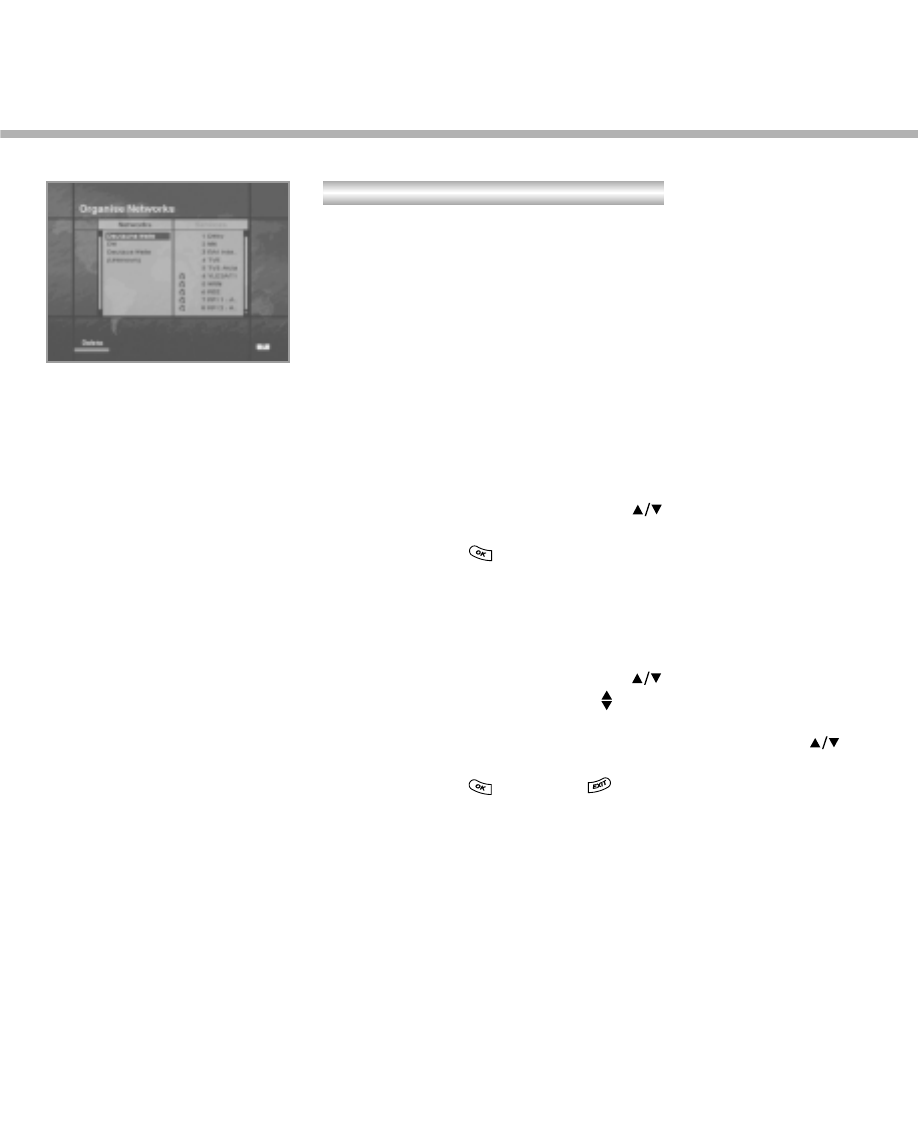
The Organise Networks menu supplies the following functions:
• Delete the network. This will delete all services belonging to the
network.
• Move/reorder the networks in the network list.
• Sort the services according the network.
In the Organise Networks menu, there are two columns: the network
list column and the service list column.
The services are displayed in the service column according to the
their networks.
To delete the network, proceed as follows:
1. Activate the Organise Networks menu via the Main menu.
2. Move the cursor to the network list column.
3. Select the network name using the button.
4. Press the RED button to mark the selected network.
5. Press the OK ( ) button to delete the marked networks.
To move/change the order of the network in the network list,
proceed as follows:
1. Activate the Organise Networks menu via the Main menu.
2. Move the cursor to the network list column.
3. Select the network name using the button.
4. Press the GREEN button. The icon is then displayed beside
the network name.
5. Move the network name to the desired position using the
button.
6. Press the OK ( ) or EXIT ( ) button to confirm.
Organise Networks
GB37
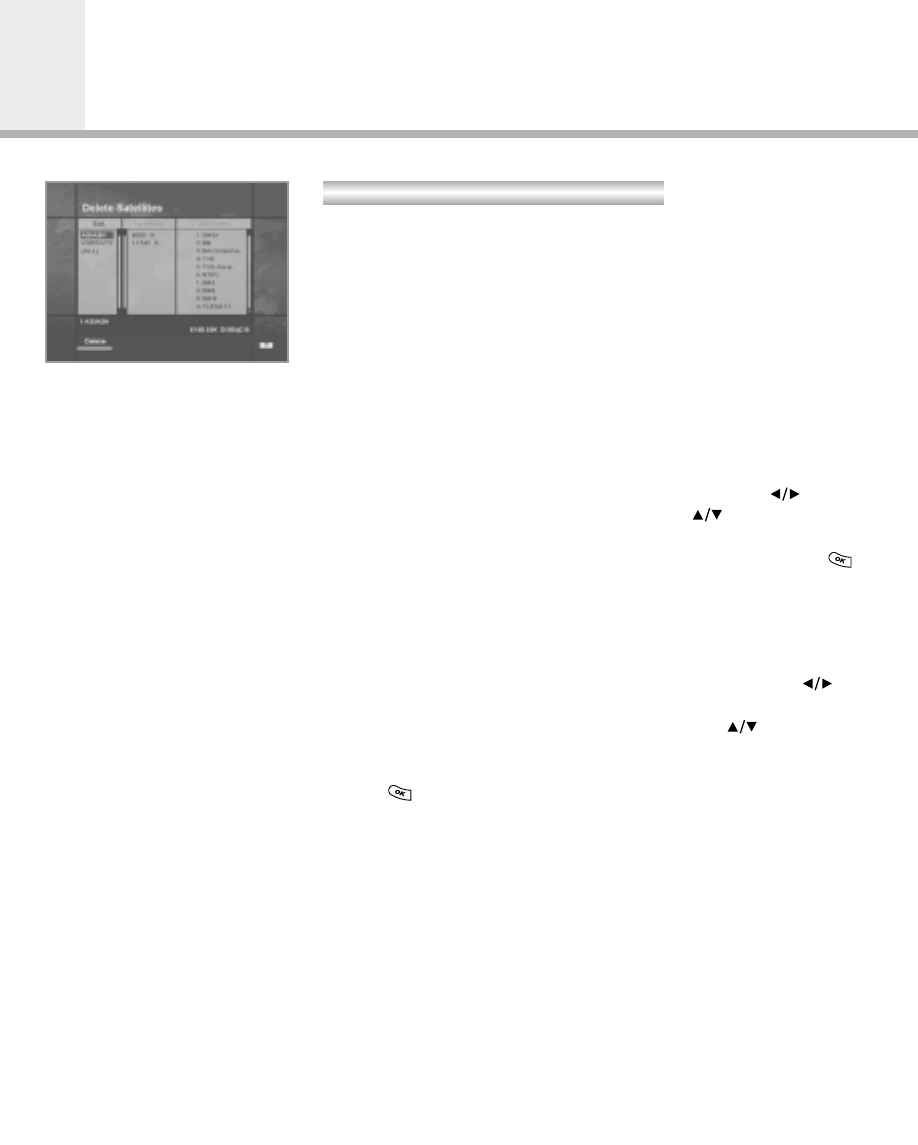
Main Menu Guide
The Delete Satellites menu supplies the following functions:
• Delete a satellite. It will also delete all services belonging to the
satellite.
• Delete a transponder. It will also delete all services belonging to
the transponder.
• Sort the services according to the satellite and the transponder.
In the Delete Satellite menu, there are three columns:
‘SAT” (the satellite list column), “TP (MHz)” (the transponder list
column) and “Services” (the service list column).
To delete a satellite, proceed as follows:
1. Activate the Delete Satellite menu via the Main menu.
2. Move the cursor to the satellite list column using the button.
3. Select the desired satellite name using the button.
4. Press the RED button to mark the satellite name.
5. If all the desired satellite names are marked, press the OK ( )
button to delete all the marked satellite names.
6. If all the satellites are to be deleted, mark the “ALL” item.
To delete a satellite transponder, proceed as follows:
1. Activate the Delete Satellite menu via the Main menu.
2. Move the cursor to the transponder list column using the
button.
3. Select the desired transponder name using the button.
4. Press the RED button to mark the transponder name.
5. If all desired transponder names are marked, press the
OK ( ) button to delete all marked transponders.
Delete Satellites
GB38
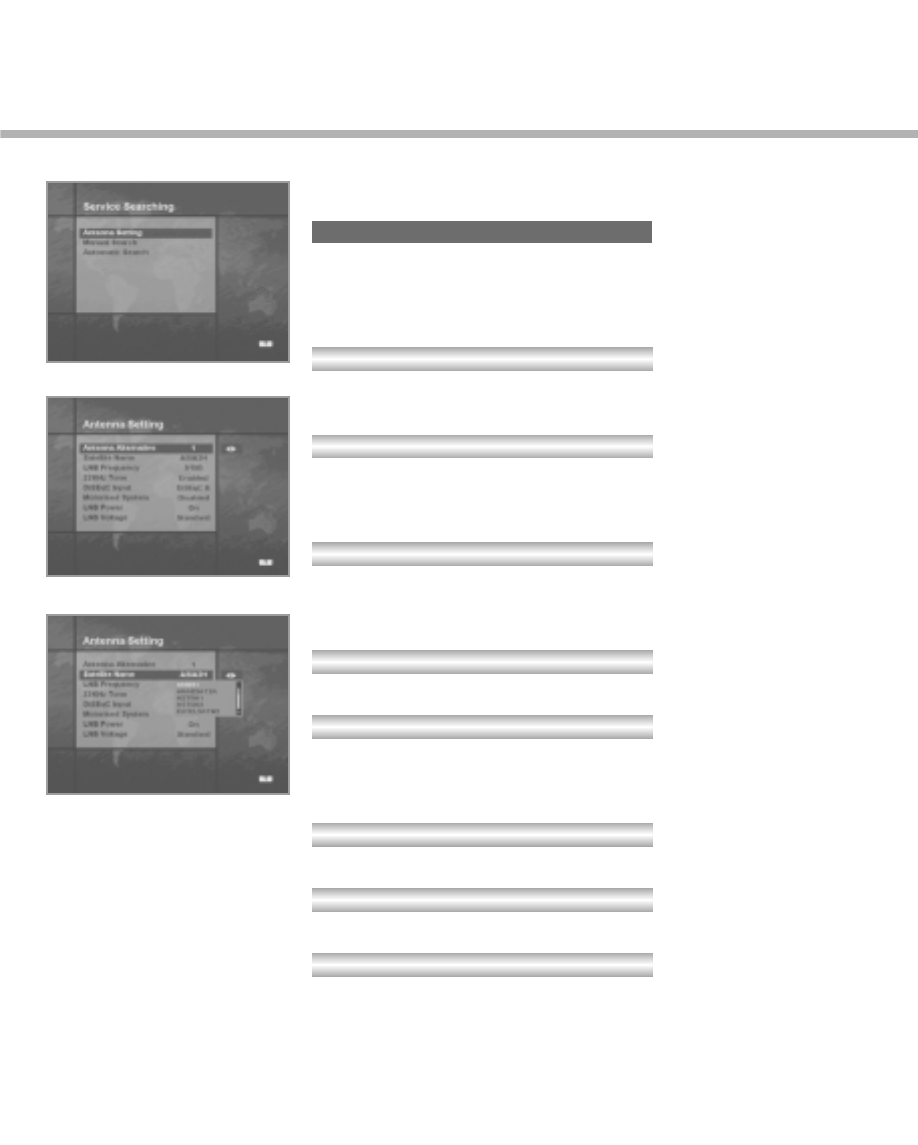
3-3. Service Searching
The Antenna Setting menu sets the characteristics of each antenna.
32 antennae can be supported, one of which for SMATV.
The Antenna Setting menu supplies the following items to
characterise the antenna.
Assigns an index to each antenna. Hence, the value is unique for
each antenna. It can assign up to 32 indexes.
Assigns a satellite name to each antenna. The available satellite
names supplied by default can be used. Moreover, the satellite
name can be defined by the user with the “User Defined” item.
Assigns LNB frequency of LNB in each antenna. It can be set
as “Universal”, “5150”, “9750”, “10600”, “10750” and “11475”.
It can also be set as any value using the numeric buttons.
Disables/enables the 22KHz tone in the signal line.
It sets the DiSEqC input to select a proper antenna.
It can be set as “Tone Burst A”, “Tone Burst B”, “DiSEqC A”,
“DiSEqC B”, “DiSEqC C” and “DiSEqC D”.
Disables/enables the motorise function.
Switches/off the LNB power.
Sets the LNB voltage level. The LNB voltage may drop too low to
supply power to the LNB due to the long length of the signal cable.
To compensate the voltage drop, the item should be set on “High”.
Antenna Setting
Antenna Alternative
22KHz Tone
DiSEqC Input
LNB Power
LNB Voltage
LNB Frequency
Satellite Name
Motorised System
GB39
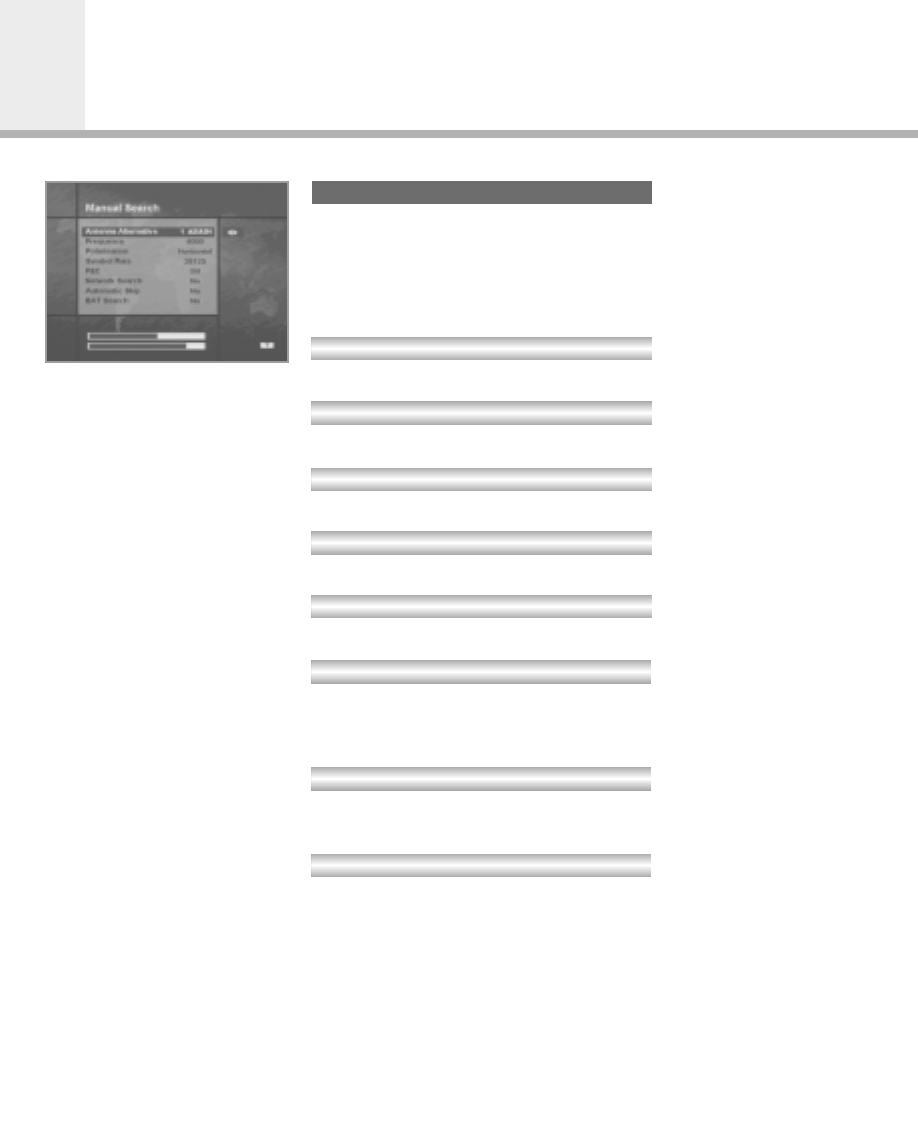
Main Menu Guide
The function of the Manual Search menu is to search services in
one transponder using information from a satellite transponder.
(If the Network Search option is enabled, services in other
transponders are searched).
The following items are supplied as parameters:
Specifies the antenna used for searching.
Sets the frequency of a transponder.
Sets the polarisation type (horizontal or vertical).
Sets the symbol rate of a transponder.
Sets the FEC value of a transponder.
Enables/disables the network search option. If the option is enabled,
all services in other transponders may be searched according to
information in the NIT.
Enables/disables the automatic skip option. If this option is enabled,
the scrambled services are skipped during the search.
Some operators define the order of services in a list using BAT.
If this option is enabled, the services will be ordered according to
the BAT information.
Manual Search
Antenna Alternative
Frequency
Polarisation
Symbol Rate
FEC(Forward Error Correction)
Network Search
Automatic Skip
BAT Search
GB40
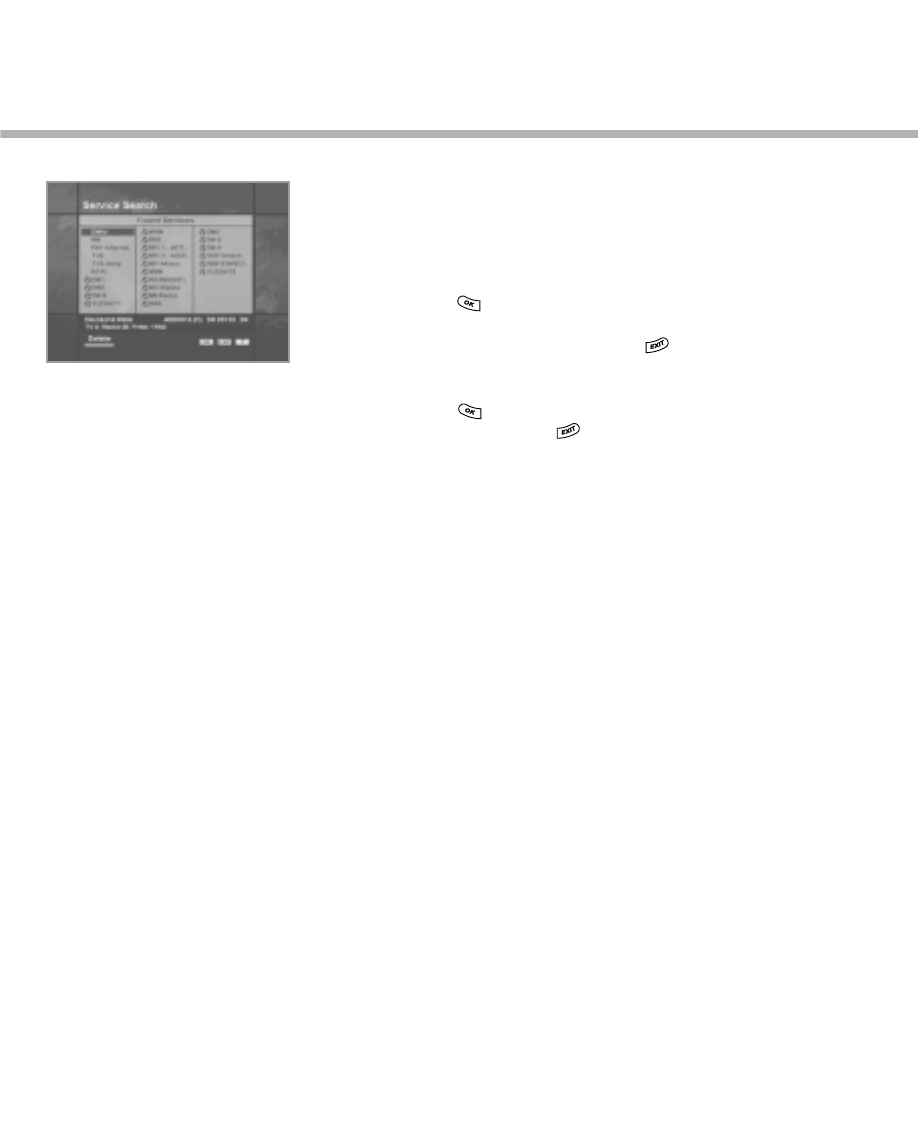
To manually search the services, proceed as follows:
1. Activate the Manual Search menu via the Main menu.
2. Set all the parameters according to transponder information.
3. Use the progressive bars at the bottom of window to check
whether or not the transponder is locked.
4. Press the OK ( ) button to activate the search services.
During the search, a sandglass rotates vertically.
5. To cancel the search, press the EXIT ( ) button.
6. If the search has been carried out, the searched services are
displayed.
7. Press the OK ( ) button to save the services,
otherwise, press the EXIT ( ) button to discard all the services.
GB41

Guide of Main Menu
Automatic Search
The function of the Automatic Search menu is to search services
using information from a satellite.
The following items are supplied as parameters.
Specifies the satellite in which the automatic search will be
performed.
Enables/disables the automatic skip option. If this option is enabled,
the scrambled services are skipped during the search.
Specifies search type. If the search type is “Detail”, then four symbol
rates are added and used during the search.
Upsets up to four symbol rates for searching when the search type
is “Detail”.
To automatically search the services, proceed as follows:
1. Activate the Automatic Search menu.
2. Set all the parameters according to the satellite information.
3. Press the OK ( ) button to start the search.
4. Press the EXIT ( ) button to cancel during the search.
The Automatic Search may take a long time to search all the
services, depending on the parameter settings.
Since the Automatic Search is based on hard-coded information,
this information is properly updated to search all services.
To obtain the updated information, please consult the HUMAX web
site.
Antenna Alternative
Automatic Skip
Search Type
Symbol Rate table(optional)
GB42
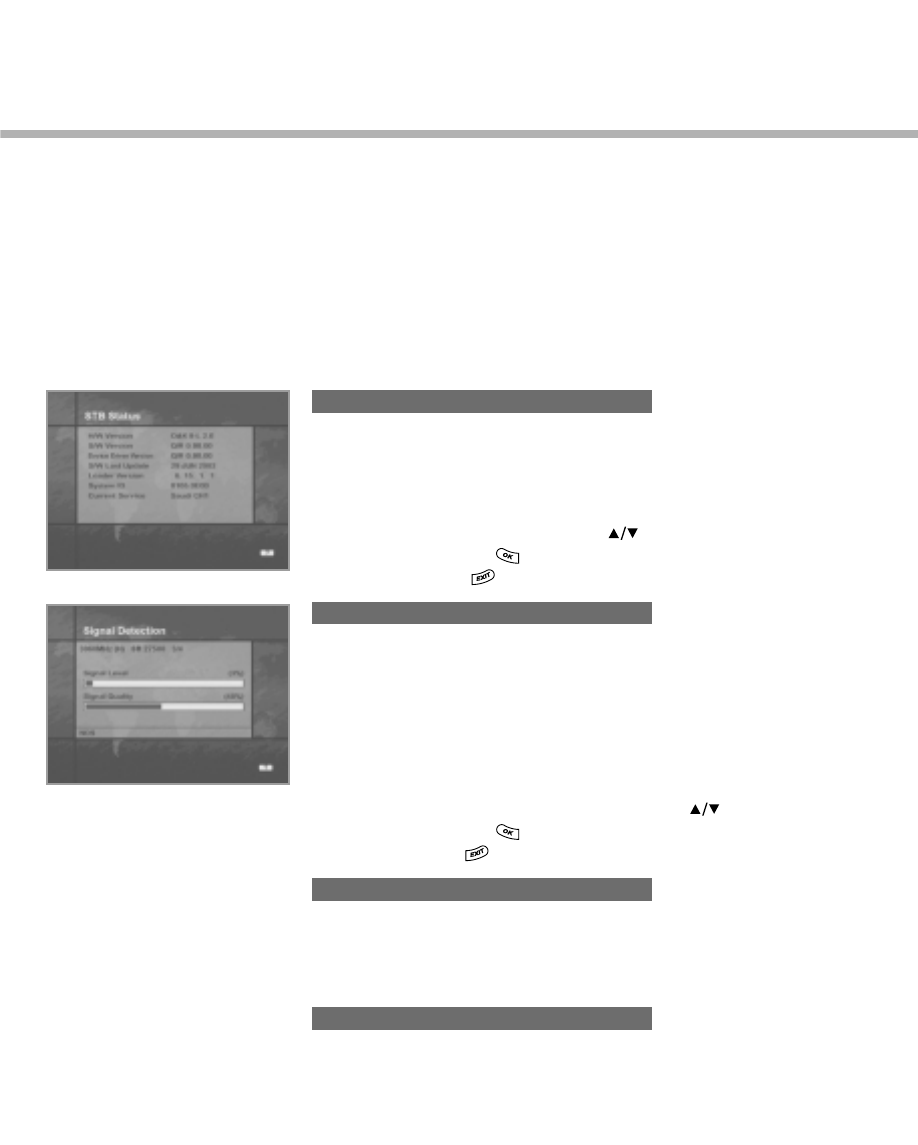
3-4. Status
The function of the Status menu is to supply users with information
on several STB statuses, such as:
• Information on the Software version,
• Information on the Hardware version,
• Information on the signal level of the current locked TP,
• Information on OTA availability.
This information is mainly intended for operators or installers.
The STB status menu supplies information on the software and
hardware versions.
To receive the information, proceed as follows:
1. Activate the Status Menu via the Main menu.
2. Select the Status menu using the button,
then press the OK ( ) button to enter the menu.
3. Press the EXIT ( ) button to exit the menu.
The Signal Detection menu supplies information on signal level and
signal quality.
This can be used when the antenna is adjusted to the desired
satellite as the signal level and quality are maximally high when the
antenna is pointed directly at the satellite.
To receive the information, proceed as follows:
1. Activate the Status Menu via the Main menu.
2. Select the Signal Detection menu using the button,
then press the OK ( ) button to enter the menu.
3.Press the EXIT ( ) button to exit the menu.
The OTA can be performed via the STB Upgrade menu.
If there is an available OTA image on the air, the menu may be
selected. Otherwise, the menu is greyed out and cannot be
selected.
The Loader Status menu supplies information on the loader status.
STB Status
Signal Detection
STB Upgrade
Loader Status
GB43
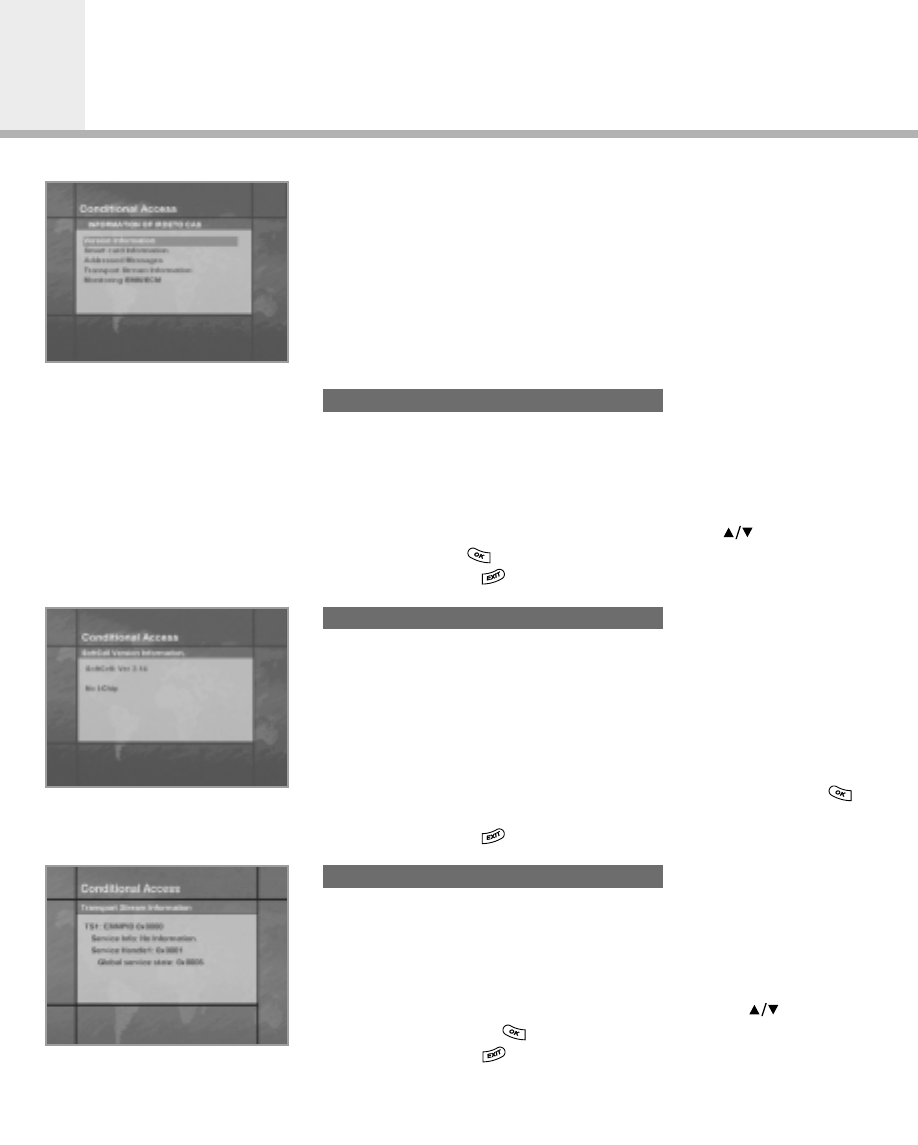
Main Menu Guide
3-5. Conditional Access
The Conditional Access menu supplies information on
IRDETO embedded CAS.
There are four sub-menus in the menu:
• Version Information,
• Smart Card Information,
• Transport Stream Information,
• Monitoring ECM/EMM.
The Version Information menu supplies technical information on
IRDETO embedded CAS.
To retrieve the information, proceed as follows:
1. Activate the Conditional Access menu via the Main menu.
2. Select the Version Information menu using the button and
press the OK ( ) button to retrieve the information.
3. Press the EXIT ( ) button to exit the menu.
The Smart card Information menu supplies information on
the smart card in the slot, such as serial number and nationality.
If there is no smart card or an invalid one in the slot, the menu
cannot be entered.
To retrieve the information, proceed as follows:
1. Activate the Conditional Access menu via the Main menu.
2. Select the Smart card Information menu and press the OK ( )
button to retrieve the information.
3. Press the EXIT ( ) button to exit the menu.
The Transport stream Information supplies information on the
current service such as EMM PID and the service status.
To retrieve the information, proceed as follows:
1. Activate the Conditional Access menu via the Main menu.
2. Select the Transport stream Information using the button
and press the OK ( ) button to retrieve the information.
3. Press the EXIT ( ) button to exit the menu.
Version Information
Smart card Information
Transport Stream Information
GB44
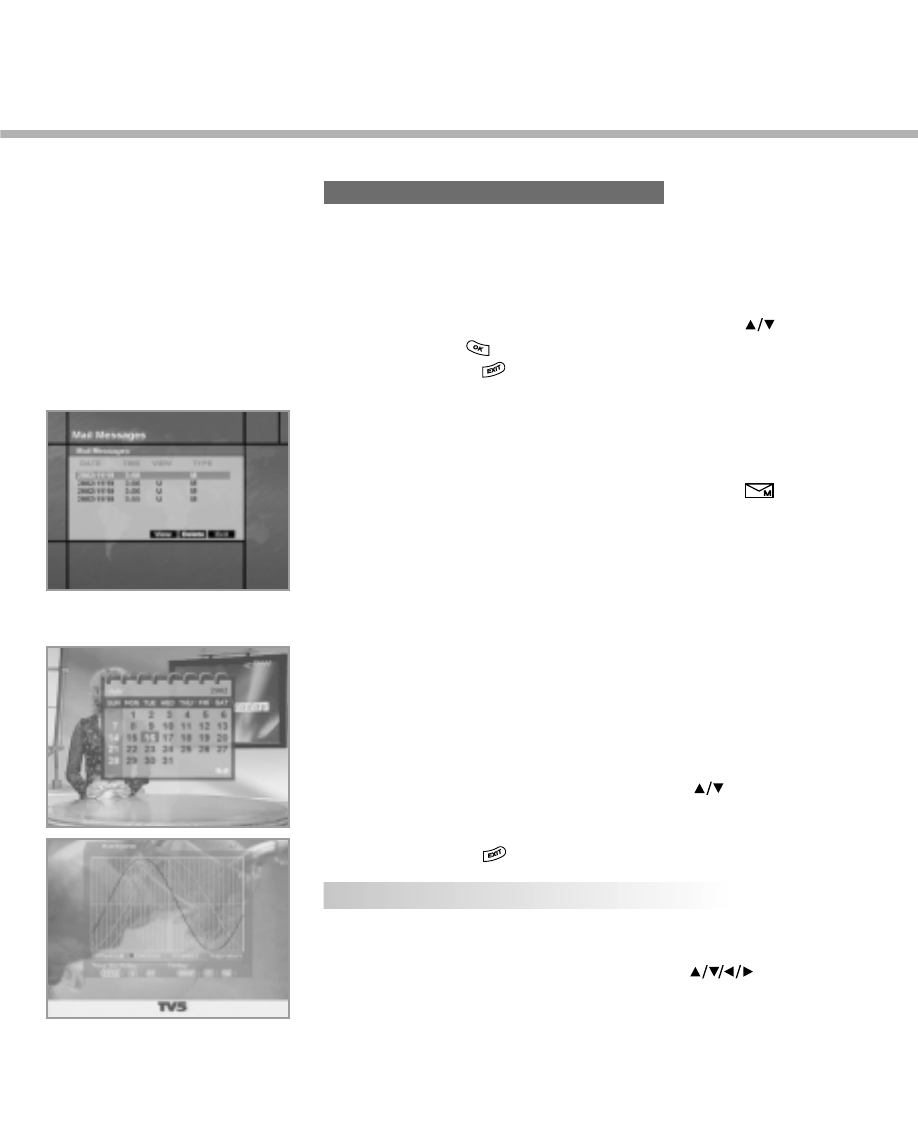
The Monitoring EMM/ECM menu periodically supplies information
on the ECM and EMM.
To retrieve the information, proceed as follows:
1. Activate the Conditional Access menu.
2. Select the Monitoring EMM/ECM menu using the button and
press the OK ( ) button to retrieve the information.
3. Press the EXIT ( ) button to exit the menu.
3-6. Mail Messages
The Mail Messages menu shows the mail messages received over
the air. The mail messages are intended for the operator, to inform
users. If there is a new mail message available, the icon
appears at the top right corner of the screen. There are four
columns in the menu, such as the received date and time (DATE &
TIME), view status (VIEW) and the type (TYPE).
If the mail message has not yet been viewed, a ‘U’ is marked in the
“VIEW” column. In the menu, the mail can be viewed or deleted
from the mail list.
The mark ‘M’ in the “TYPE” column means that the mail message
received is a normal mail message.
The mark ‘A’ in the “TYPE” column means that the received mail
message is a message of announcement.
To view or delete the mail message, proceed as follows:
1. Activate the Mail Message menu via the Main menu.
2. Select the desired mail message using the button.
3. Press the GREEN button to view it.
4. Press the YELLOW button to delete it.
5. Press the EXIT ( ) or BLUE button to exit the menu.
The Utility menu supplies two functions: Calendar and Biorhythm.
In “Calendar”, the current calendar is displayed on the screen.
The desired month can be chosen using the button.
In “Biorhythm”, if the date of birth is input, the specific biorhythm is
displayed on the screen.
4. Utility
Monitoring EMM/ECM
GB45
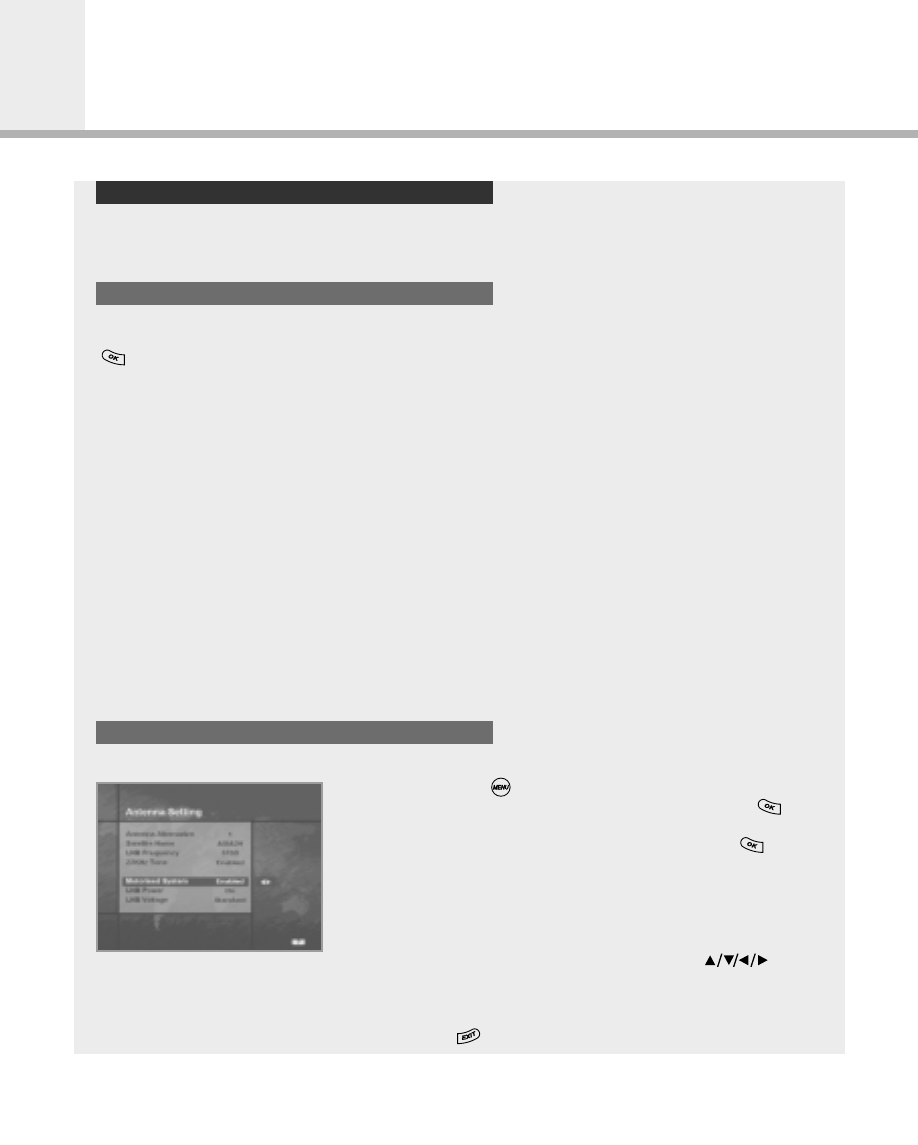
DiSEqC 1.2 User Instructions
If you have a DiSEqC 1.2 motorised system, you can use the available DiSEqC 1.2 functions.
The following instruction describes how to use the DiSEqC 1.2 functions to store the positions of the
satellites and search for the services (STAB Rotor Sat motor recommended).
When the DiSEqC Motorised System is Enabled in the Antenna Setting, a new menu is available for
configuring the motor. This menu is called “Satellite Setting” and is accessed by pressing the OK
( ) button with the Alternative Antenna option highlighted in the Manual Search menu.
The following options are available on the Satellite Setting menu:
Satellite Name
A selection of satellite names that can be used to identify a motor position. If the satellite name you
require is not available, please use another one. In installer mode, the Satellite Name Reference
refers to the 0 position of the motor.
Movement
In user mode, this is used to fine-tune the position of the motor for better reception.
In Installer mode, this is used to manually search for the position of a satellite.
Motor Control
• Search: Searches for services on the chosen transponder.
• Goto: Moves the motor to the stored position of the selected satellite name.
• Store: Stores the current position of the motor for the selected satellite name.
• Reset: Resets all stored positions of the motor relative to the 0 position (Installer mode only).
DiSEqC Command Mode
Changes the current mode between Installer and User.
You must set your receiver up so that it is ready to use DiSEqC 1.2. To do so, proceed as follows:
1. Press the MENU ( ) button to display the Main menu.
2. Select the Service Searching option and press the OK ()
button to display the Service Searching menu.
3. Select the Antenna Setting option and press the OK ()
button to display the Antenna Setting menu.
4. You must set up a separate alternative antenna for each
satellite position required.
5. Select the name of the satellite you wish to use.
6. Select the correct LNB frequency for the LNB you are using.
7. Set the Motorised System to Enable to use the
buttons.
8. The option DiSEqC Input Selection should now be disabled. This option is used for DiSEqC 1.0
and cannot be used in conjunction with DiSEqC 1.2. Your receiver is now ready to use DiSEqC
1.2. To return to the Main Menu, use the EXIT () button until you reach the Main menu.
2. Setting your Receiver for DiSEqC 1.2
1. Satellite Setting Menu Options
Motorised System
GB46
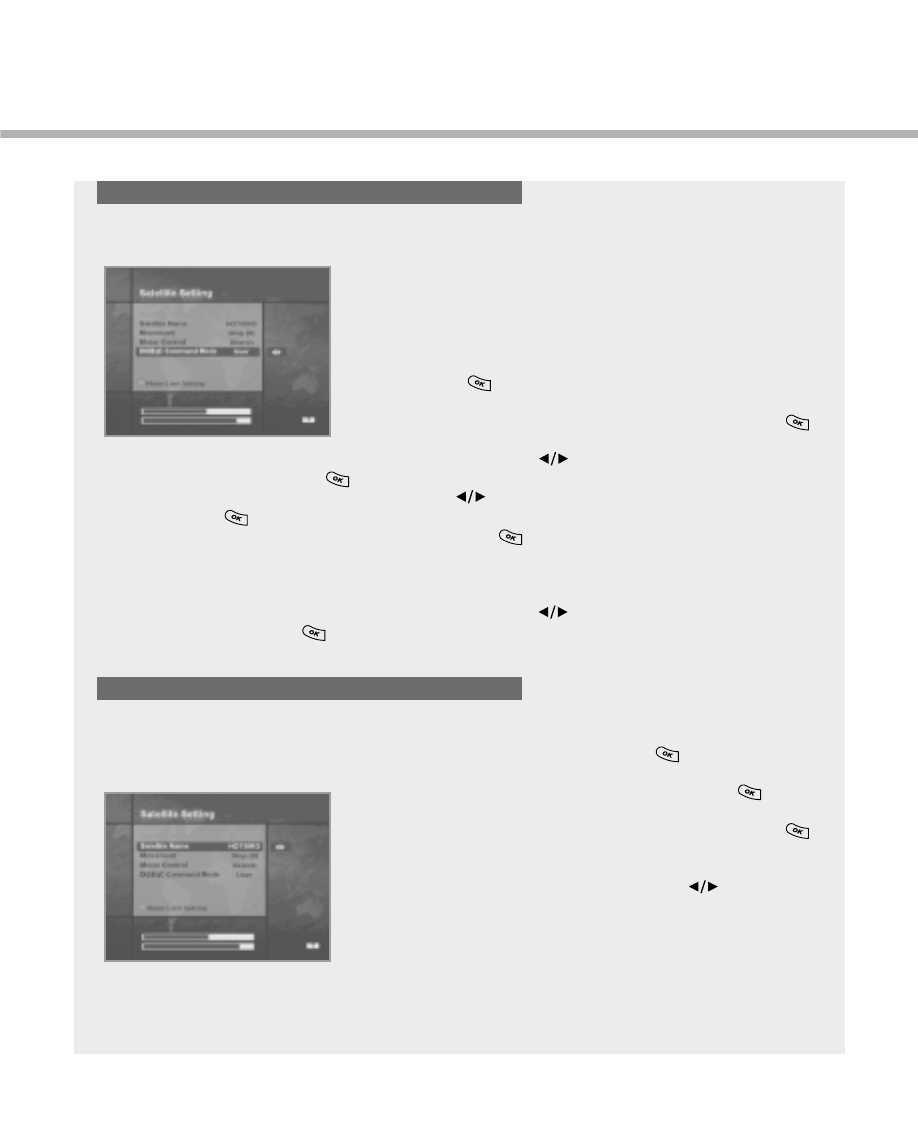
3. Initial Satellite Position Search
This is required when you first set your receiver up to use DiSEqC 1.2, and sets the positions of all
pre-programmed satellites.
1. Make sure your motor is installed correctly with the calibrations
adjusted for the region in which you are located.
(Please consult the user’s manual for your motor).
2. Make sure your receiver is set up to use DiSEqC 1.2.
(see Section 2 above).
3. In the Main menu, select the Service Searching option and
press the OK () button. You should now see the Service
Searching menu.
4. Highlight the Alternative Antenna option and press the OK ()
button to display the Satellite Setting menu.
5. Highlight the DiSEqC Command Mode option and use the buttons to change the value to
Installer, then press the OK () button.
6. Highlight the Motor Control option and use the buttons to change the value to reset, then
press the OK () button.
7. You will now see a warning message. Press the OK () button to continue. All the pre-
programmed satellite motor positions should now be correct. If you have any other DiSEqC 1.2
motor brand or model, then you may need to store the satellite positions yourself. (Please refer to
the user’s manual for your motor).
8. Highlight the DiSEqC Command Mode option and use the buttons to change the value to
User, then press the OK () button.
9. You should now be ready to start storing services for the various satellites (see 5 onwards).
Use this option to set the East and West limits of the motor. This should be used to prevent your dish
from hitting anything that may obstruct the path of the dish.
1. On the Main menu, select the Service Searching option and press the OK () button.
You should now see the Service Searching menu.
2. Select the Manual Search option and press the OK ()
button. You should now see the Manual Search menu.
3. Highlight the Alternative Antenna option and press the OK ()
button. You should now be in the Satellite Settings menu.
4. Press the RED button to access the Motor Limit Setting menu.
5. Highlight the Limit Setting option and use the buttons to
disable this. (
Warning
:When this option is disabled, your motor
will be able to move beyond any limits previously
stored - please make sure there is nothing obstructing
the path of your dish.)
4. Motor Limit Setting
GB47

6. To set the East Limit:
a) Select “Movement” and use the buttons to move your
motor East or West until it is at the position you wish
to use as your East Limit. Use the buttons to stop the
motor at the correct position.
b) Highlight the Store East Limit option and press the OK ()
button to store the current position as your East Limit.
To set the West Limit:
a) Select “Movement” and use the buttons to move your
motor East or West until it is at the position you wish
to use as your West Limit. Use the buttons to stop the motor at the correct position.
b) Highlight the Store West Limit option and press the OK () button to store the current position
as your West Limit.
The purpose of this is to set the motor position manually for each satellite.
This is useful if the satellite you require is not available in the pre-programmed list (see 3 above).
To do this, you must access the Satellite Settings menu. Proceed as follows:
1. Select “Service Searching” from the Main menu and press the OK () button to display the
Service Searching menu.
2. Select the Manual Search option and press the OK () button to display the Manual Search
menu. Select the relevant Alternative Antenna you are using for this satellite.
3. Enter the Frequency, Polarisation, Symbol Rate and FEC for a transponder on the satellite you
wish to find. The transponder information should be unique to the satellite.
4. Select the Alternative Antenna option and press the OK () button to display the Satellite
Settings menu.
5. Highlight the DiSEqC Command Mode option and, using the buttons, change this to Installer.
6. Highlight the Satellite name option and use the buttons to select the satellite you want to find.
Use others if the name of the satellite you want does not appear.
7. When you have selected the satellite you are looking for, go down to the Movement option, and
again using the buttons, start the motor moving.
8. You should move the motor as far west as possible and then move it east so that you cover the
motor’s complete movement range.
9. During the move from west to east, the Signal Quality bar should register a signal once.
This is the satellite’s position. If there two or more different positions register a
signal, then you must choose another frequency that will be unique to the satellite you want.
10. Use the Signal level and Strength Quality bar at the bottom of the screen to judge the best
position for the dish.
11. Use the buttons to stop the motor when required.
12. When you have found the best position for the dish, go to the Motor Control option, and using the
buttons, select “Store” and press the OK () button. The position of the satellite should
now be stored.
13. If you have not stored this position, it will be lost when you exit the menu.
14. Repeat the process for each satellite if required, remembering to use a different alternative
antenna for each satellite.
5. Manual Satellite Search
Motorised System
GB48
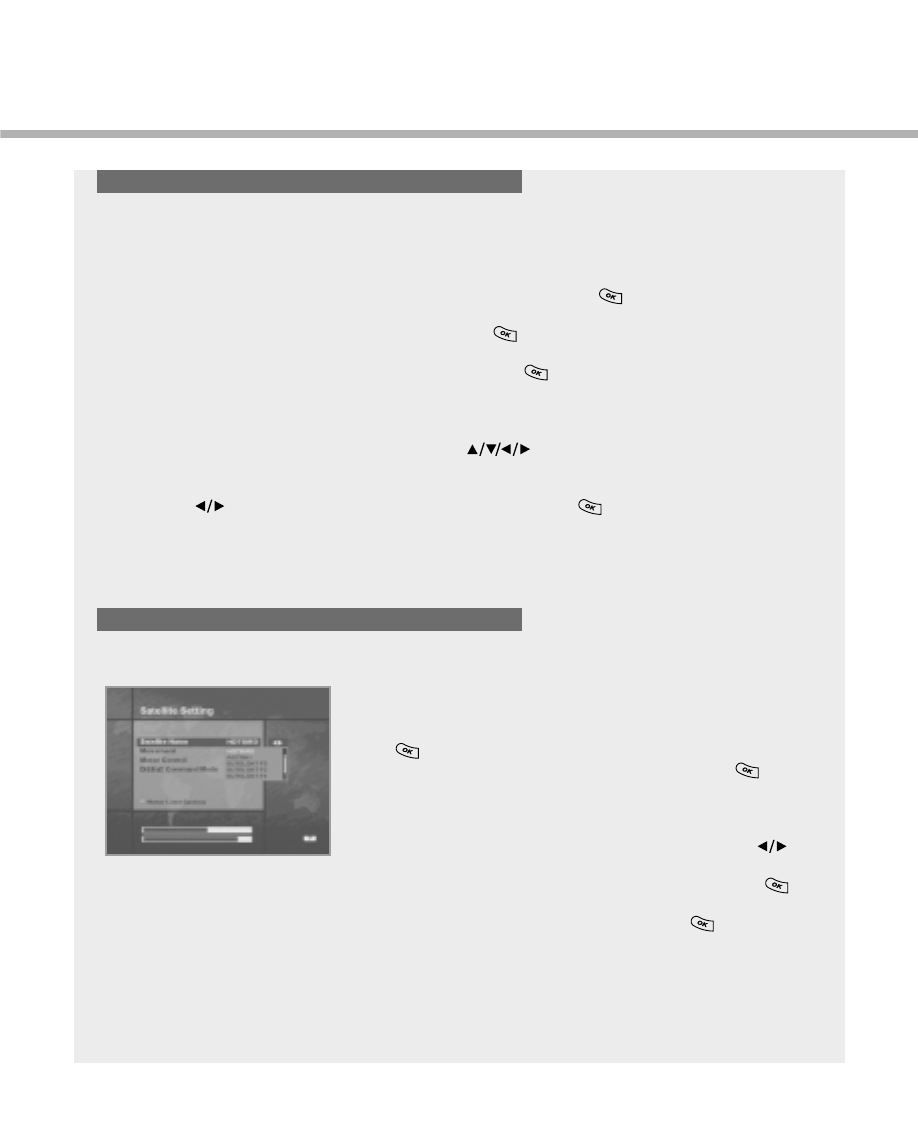
Once you have stored the positions of the satellites you want (see below left) you can search for the
services transmitted from them. Before doing this, you must move the motor to the position of the
satellite you wish to search for. To do this, you must access the Satellite Settings menu. Proceed as
follows:
1. Select “Service Searching” from the Main menu and press the OK () button to display the
Service Searching menu.
2. Select the Manual Search option and press the OK () button to display the Manual Search
menu.
3. Select the Alternative Antenna option and press the OK () button to display the Satellite
Settings menu.
4. In the Satellite Settings menu ensure that you have the DiSEqC Command Mode option set to
“User”.
5. Highlight the option Satellite Name and use the buttons to select the satellite you want
to view.
6. When you have selected the satellite you wish to view, go down to the Motor Control option and,
using the buttons again, select “Go to” and press the OK () button.
7. The motor will now move to the selected satellite’s position.
8. The Movement option is used to fine-tune the motor’s position.
9. When using the Movement option for fine-tuning, you must remember to store the changes you
have made, otherwise they will be lost.
Once you have moved the motor into position, you can search for the channels transmitted from the
relevant satellite. To search for services on your new selected satellite, proceed as follows:
1. Move the motor to the position of the satellite you wish to
search for (see section 6 above):
2. Select “Service Searching” from the Main menu and press the
OK () button to display the Service Searching menu.
3. Select the manual search option and press the OK () button
to display the Manual Search menu.
4. Now enter the Frequency and Symbol Rate using the NUMERIC
buttons (0~9).
Next, enter the Polarisation and FEC values using the
buttons.
5. When you have entered all these details, press the OK ()
button and the search will begin.
6. When the search has finished, press the OK () button to
view.
7. Repeat the process for all the transponders you want from this
satellite.
6. Moving to a pre-set satellite
7. Searching for services on your selected Satellite
GB49

It is possible to use automatic search using the DiSEqC 1.2 motorised system.
1. Ensure that the position for the satellite you want to search for is correct (see Section 3 and 5
above).
2. In the Main menu, select the channel searching option and press the OK () button.
3. In the Service Searching menu, select the Alternative Antenna that you 3set for this satellite.
4. When you search new services, please refer to Automatic Search on page GB42.
5. When the search has ended, press the OK () button to store and view the services.
Now that you have stored all the satellite positions and searched for all the services you want, you
can use your receiver as normal. When you change to a service transmitted from a different
satellite, you will have to wait a few seconds to allow the motor to move into position to receive the
new service.
8. Automatic Search
Motorised System
GB50
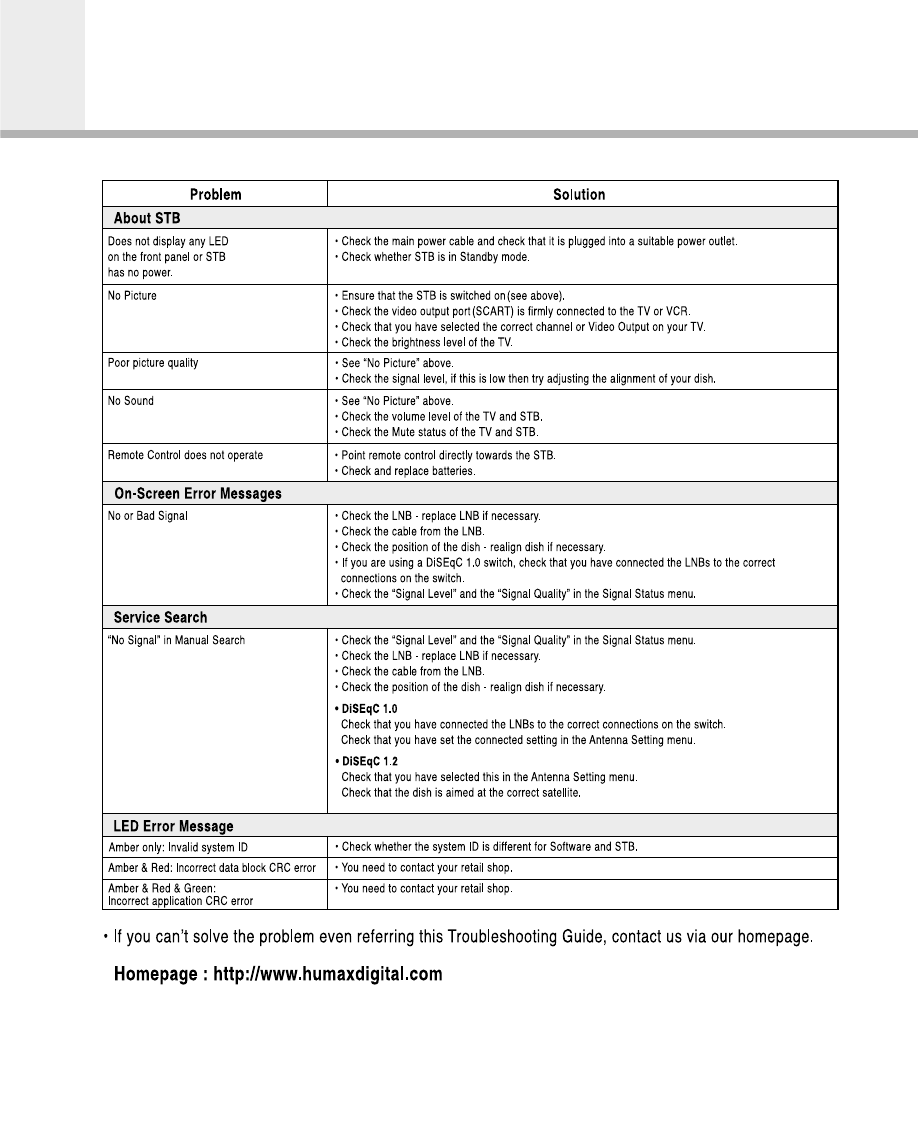
Troubleshooting Guide
GB51
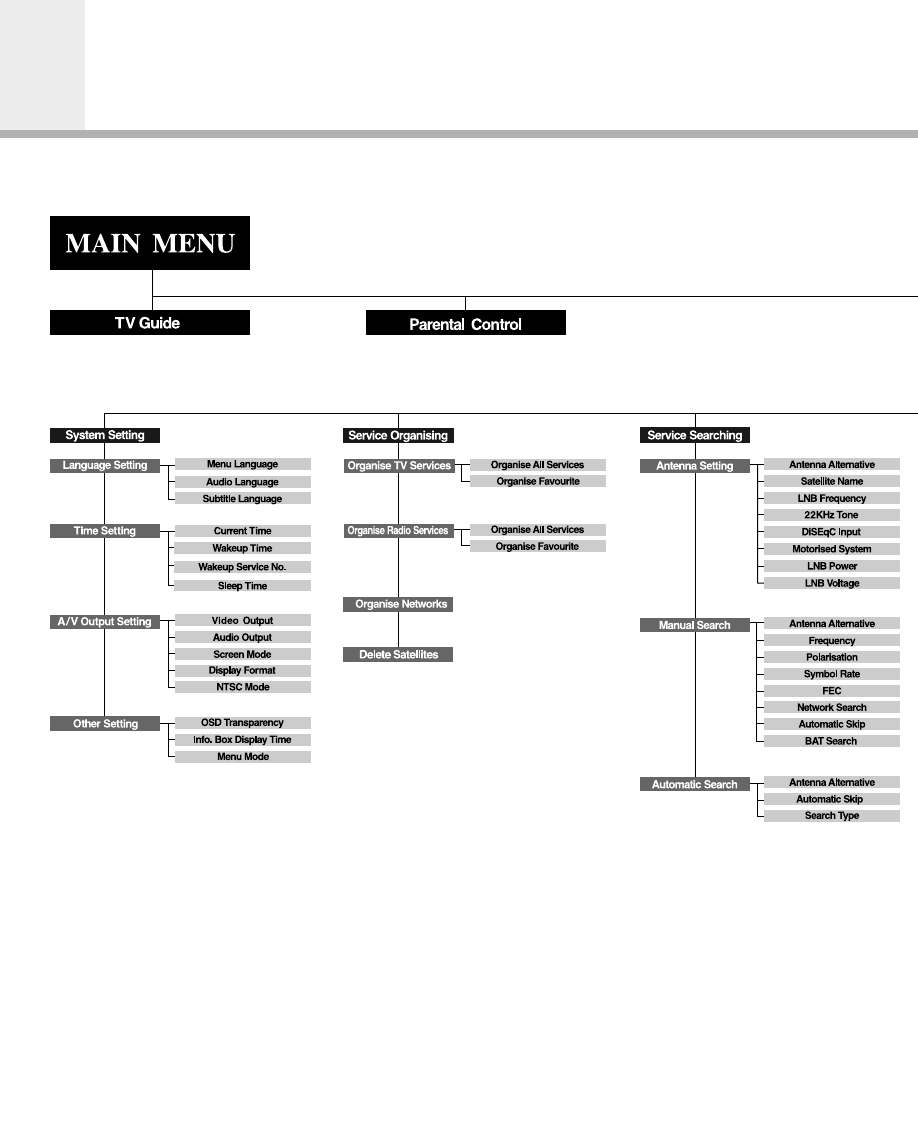
Menu Map
GB52

GB53

Tuner & Channel
Conditional Access Interface
MPEG Transport Stream A/V Decoding
Memory
Input Connector
Frequency Range
Input Impedance
Signal Level
IF
IF Band width
LNB Power &
Polarisation
22 KHz Tone
DiSEqC Control
Demodulation
Input Symbol Rate
FEC Decode
Transport Stream
Profile Level
Input Rate
Aspect Ratio
Video Resolution
Audio Decoding
Audio Mode
Sampling
Main Processor
Flash Memory
Graphic(MPEG) DRAM
System DRAM
TMIPS R3930 (81 MHz)
3 Mbyte
4 Mbyte
2 Mbyte
MPEG-2 ISO/IEC 13818
Transport stream specification
MPEG-2 MP@ML
15 Mbit/s Max
4:3, 16:9
720 x 576
MPEG/MusiCam Layer I & II
Single channel/Dual channel/Joint stereo/Stereo
32, 44,1 and 48 KHz
F-type, IEC 169-24, Female
950 MHz to 2150 MHz
75Ω
-25 to -65 dBm
480 MHz
36 MHz
Vertical : +13.5 V
Horizontal : +18 V
Current : 500 mA Max. Overload Protection
Frequency : 22 ± 4 KHz Amplitude : 0.6 ± 0.2 V
Version 1.0/1.2 Compatible
QPSK
1-45 Ms/s
Convolutional Code Rate 1/2, 2/3, 3/4, 5/6 and 7/8
with Constraint Length K=7
•
Please note
: The specification of the STB may be changed without advance notice.
Irdeto Embedded 1 Slot Smart card
Specification
GB54
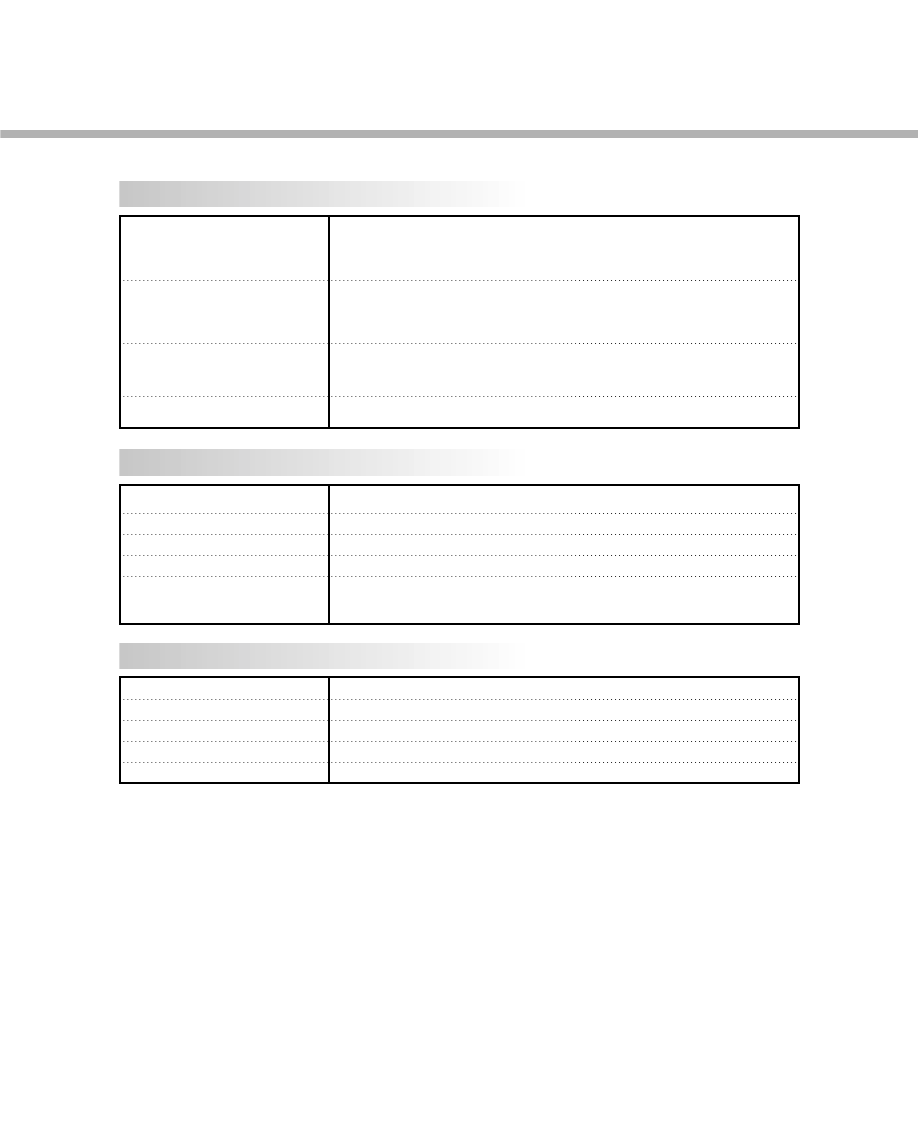
A/V & Data In/Out
TV SCART
VCR SCART
AUDIO R/L
RS-232C
Video Output (CVBS, RGB, S-Video)
Audio Output
(Resolution : 20 bits DAC, Max. 2 Vrms)
Video Output (CVBS)
Video Input (CVBS, RGB, S-Video)
Audio Output (Resolution : 20 bits DAC, Max. 2 Vrms(fixed))
RCA/Cinch Volume and Mute Control
(Resolution : 20 bits DAC, Max. 2 Vrms)
Transfer rate 115,200 bps, 9pin D-sub Type
Physical Specifications
Size (W x H x D)
Weight (Net)
Operating Temp
Storage Temp
Storage Humidity
260
x
50
x
180 mm
Around 1.3 kg
0°C to + 45°C
-10°C to + 70°C
5% ~ 95% RH (Non-Condensing)
Power Supply
Input Voltage
Type
Power Consumption
Standby Power
Protection
90 - 250V AC, 50/60 Hz
SMPS
Max. 30 W
≤8 W
Separate internal fuse. The input should be protected against
lightning
• You can use a special antenna switch with DiSEqC commands.
When changing ASTRA1 to EUTELSAT, for example, a DiSEqC command is sent
with the 22KHz tone via the antenna cable. The antenna switch will change
ASTRA1 to EUTELSAT. The DiSEqC concept is a protective trademark of
EUTELSAT.
• Data rate decides the picture quality of digital TV programmes.
The data rate of about 5-6 Mbit/s coincides with the picture quality of an analogue
TV programme.
GB55
